ACESO (Akeso) The goddess of curing illness and healing wounds.
ACHELOIDES (Akheloides) The naiad daughters of the river Achelous who attended on the god in his river-bed palace.
ACHELOUS (Akheloios) A river of Aetolia in Greece and its god. He wrestled Heracles for the hand of Deianeira but lost the contest and with it his horn.
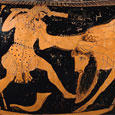 |
ACHELOUS |
ACHILLES (Akhilleus) The great Phthian hero of the Trojan War.
ACHLYS (Akhlys) The ugly hag who personified misery.
ACIS (Akis) A boy loved by the Nereid Galatea who was crushed beneath a rock by the jealous Cyclops Polyphemus and on his death transformed into a Sicilian River-God.
ACMON (1) (Akmon) One of the Dactyls.
ACMON (2) (Akmon) One of the monkey-like Cercopes.
ACRAEA (Akraia) A naiad daughter of the river Asterion. With her sisters Euboea and Prosymna she nursed the infant goddess Hera.
ACRATUS (Akratos) The daemon of unmixed wine and incontinence.
ACTE (Akte) The ninth of the twelve Horai (Hours), she was goddess of one of the hours of the afternoon.
ADEPHAGIA The goddess of gluttony.
ADICIA (Adikia) The female personification of injustice.
ADRASTEIA One of the nurses of Zeus in Crete.
AEA (Aia) A Nymph loved by the Colchian river-god Phasis.
AEACUS (Aiakos) One of the three Judges of the Underworld. He was a king of Aigina appointed to this position after death.
AEDOS (Aidos) The female personification of modesty and respect. She and Nemesis were the last of the good spirits to depart from the earth in the final and most corrupted age of mankind.
AEGAEON (1) (Aigaios) An ancient sea-god allied with theTitans.
AEGAEON (2) (Aigaion) One of the Gigantes who made war on the gods.
AEGAEUS (Aigaios) A river of Scheria (island of the Phaeacians) and its dvinity.
AEGEIRUS (Aigeros) The Hamadryad nymph of the poplar tree.
AEGINA (Aigina) A Naiad daughter of the river Asopus. She was loved by Zeus who carried her off to the island of Aegina. When her father pursued them Zeus struck him with a thunderbolt.
AEGIPAN (Aigipan) The fish-goat god. When Typhon attacked Olympus Aegipan suggested the gods flee to Egypt and hide there in the form of animals. In this exodus he took the form of a goat with the tail of a fish. Later he helped to free the captured Zeus and was placed amongst the stars as the constellation Capricorn.
AEGLE (1) (Aigle) Goddess of the splendour of good health.
AEGLE (2) (Aigle) A nymph who was the mother of the Charites (Graces) by Helius the sun.
AELLO One of the Harpies.
AEOLUS (Aiolos) The Greek god of the winds. Aeolus kept the violent storm winds locked inside the floating island of Aeolia releasing them at the request of the gods.
AEON (Aion) The protogenos or primordial deity of time.
AERGIA The female personification of sloth.
AETHER (Aither) The protogenos or primeval divinity of the brightly, shining blue upper air.
AETNA (Aitna) Goddess of the volcanic Mount Etna in Sicily. She was one of the Ourea (mountain-divinities).
AEX (1) (Aix) The goat-nymph wife of the god Pan.
AEX (2) (Aix) The elder Gorgon which was slain by Zeus who made his aegis shield from its skin.
AGANIPPE A naiad daughter of the river Termessus. She was the nymph of the sacred spring of the Muses on Mount Helicon whose waters possessed the power of inspiration.
AGDISTIS A divinity conceived when Zeus impregnated Mother Earth with a nocturnal emission. It was born with male and female genitals, which so alarmed the gods they castrated it, creating the goddess Cybele.
AGLAEA (Aglaia) Goddess of beauty and one of the three Charites. She was married to Hephaestus after his divorce from Aphrodite.
AGON The male personification of contest.
AGREUS The maritime god of fishing.
AGRIUS (1) (Agrios) One of the Gigantes. He was clubbed to death by the Moirae in the Giant-War.
AGRIUS (2) (Agrios) One of a pair of half-man, half-bear, Thracian giants who fed on the flesh of men.
AGROS The male personification of the produce of the fields.
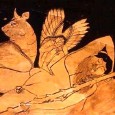 |
ALCYONEUS |
ALASTOR The daemon or spirit which cursed a house with a blood feud, and inflicted vengeance upon the generations for the sins of their fathers.
ALCE (Alke) The female personification of battle-strength and prowess.
ALCON (Alkon) One of the Cabeiri.
ALCYONE (Alkyone) One of the Pleiades who was loved by Poseidon.
ALCYONEUS (Alkyoneus) The strongest of the Gigantes. He was immortal but only within the boundaries of his homeland Pallene. In the Giant War Heracles shot him and dragged him away from his home to die.
ALCYONIDES (Alkyonides) Seven nymph daughters of the giant Alcyoneus who leapt into the sea after their father's death and were transformed into kingfishers.
ALECTO (Alekto) One of the three Erinyes.
ALETHEIA The female personification of truth.
ALEXIARES An immortal son of Heracles and Hebe. He was the demi-god who wards off war.
ALEXIROE (Alexirhoe) A naiad daughter of the river Grenicus of Troy.
ALGEA The female personifications of sorrow.
ALOADAE (Aloadai) Two gigantic sons of Poseidon who tried to storm the heavens by piling mountains one upon the other. They were slain by Apollon and Artemis.
ALPUS (Alpos) A monstrous Sicilian giant slain by Dionysos.
ALPHEIUS (Alpheios) A river of Elis in Greece and its divinity. He fell in love with the nymph Arethusa and pursued her all the way to the island Ortygia. Artemis then transformed her into a spring to escape him but Alpheius guided his stream under the sea to Sicily so he could forever mingle his waters with hers.
ALSEIDES Dryad-nymphs of the groves.
AMALTHEIA Amaltheia was the she-goat nurse of the infant Zeus. She was placed amongst the stars as the constellation Capra and her horn transformed into the cornucopia (horn of plenty).
AMECHANIA (Amekhania) The female personification of helplessness.
AMNISIADES The Naiad daughters of the river Amnisus who attended the goddess Artemis and cared for her sacred, golden-horned deer.
AMNISUS (Amnisos) A river of Crete in Greece and its divinity.
AMPELUS (Ampelos) The satyr loved by Dionysus in his youth. When he was killed by a wild bull the divinity transformed him into a grape-vine.
AMPHIARAUS A hero swallowed alive by the earth and transformed into an oracular daemon.
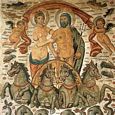 |
AMPHITRITE |
AMPHITRITE The goddess queen of the sea. She was one of the fifty Nereides and the wife of great Poseidon.
AMYMONE The Naiad of an Argive spring loved by Poseidon.
ANAIDEIA The female personification of ruthlessness.
ANANKE The primeval goddess of necessity whose serpentine form entwined with that of her consort Chronus, the god of time.
ANARESINEUS One of the fish-tailed sea gods.
ANATOLE The second of the twelve Horai (Hours). She was the goddess of the hour of dawn.
ANAX A Lydian giant.
ANCHIALE (Ankhiale) The Titan-goddess of drawing heat and igniting fire. She was the wife of Hecaterus, the Titan-god of the hands and the mother of the metal-working Dactyls (the Fingers).
ANCHINOE (Ankhinoe) An Egyptian Naiad.
ANCHIROE (1) (Ankhiroe) An Arcadian Naiad nymph.
ANCHIROE (2) (Ankhiroe) A Naiad daughter of the Libyan river Chrementes.
ANCHIROE (3) (Ankhiroe) A Naiad daughter of the river Erasinus in Greece who attended upon the vigin goddess Britomartis.
ANDROCTASIAE (Androktasiai) The personifications of manslaughter.
ANEMOI (1) The gods of the north, south, east and west winds who lived together in a cave in Thrace or at each of the four corners of the earth. Boreas was the wintry spirit of the north wind, Notus the stormy south wind of summer, Zephryus the gentle west wind of spring, and Eurus the blustery east wind of autumn.
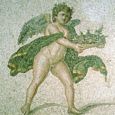 |
ANEMOS |
ANGELIA The goddess of messages.
ANIA The female personification of trouble.
ANICETUS (Aniketos) An immortal son of Heracles and Hebe. He was the demi-god of unconquerable might.
ANIGRIDES Naiad daughters of the river Angrus in Greece whose sacred springs could cure those inflicted with skin diseases.
ANIGRUS (Anigros) A river of Elis in the south of Greece and its god.
ANIPPE A Naiad daughter of the River Nile loved by Poseidon.
ANTAEUS (Antaios) A Libyan giant who drew his strength directly from his mother the goddess Earth who was slain by Heracles in a wrestling match.
ANTEROS The Greek god of unrequited love who was armed with a bow and arrows of lead.
ANTHEIA The goddess of flowers and floral wreaths. She was one of the attendants of Aphrodite.
ANTHEDON A nymph of Boetia in Greece.
ANTHRACIA (Anthrakia) One of the Arcadian nymphs who nursed Zeus.
ANTIPHATES The king of a tribe of man-eating giants, known as the Laestrygones, encountered by Odysseus on his travels.
ANYTUS (Anytos) An Arcadian Titan who fostered Demeter's daughter Despoena.
APATE The female personification of deceit.
APELIOTES The demi-god of the east wind.
APHRODITE The Greek goddess of love, beauty and intercourse, and one of the twelve great Olympian gods. She was born of sea-foam formed around the castrated genitals of the sky-god Uranus.
APHROS An Ichthyocentaur, or fish-tailed sea centaur, who carried the goddess Aphrodite ashore after her birth from the sea's foam.
APOLLO (Apollon) The Greek god of prophecy, music and healing and one of the twelve Olympians. His arrows brought plague to men.
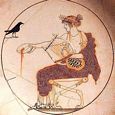 |
APOLLO |
APOTHEOTHENAI Men and women who granted immortality and a life amongst the gods.
ARAE (Arai) The female personifications of curses.
ARCE (Arke) A sister of Iris, the goddess of the rainbow. She was the messenger of the Titan-gods who was stripped of her wings and cast into Tartarus by Zeus.
ARES The Greek god of war and bloodshed, and one of the twelve Olympians.
ARETE The goddesss of virtue and excellence.
ARETHUSA (Arethousa) The Naiad nymph of a Sicilian spring who was chased across the sea from Greece by the lustful river-god Alpheus.
ARGES One of the three metal-working Cyclops.
ARGIOPE (1) A Nymphe of Mount Parnassos who was abandoned by the poet Philammon.
ARGIOPE (2) An Eleusinian nymph.
ARGUS PANOPTES (Argos Panoptes) A giant whose body was covered with a hundred eyes set by Hera to guard the maiden Io, a lover of Zeus whom the god had disguised as a cow. Zeus sent Hermes to slay Argus and after his death Hera placed his eyes on the tail feathers of the peacock.
ARGYRA A sea Nymph of Archaea in Greece loved by the hero Selemnus.
ARIADNE A Cretan princess who helped Theseus defeat the Minotaur. On her return to Athens with the hero, Dionysus abducted her and carried her off to Olympus to be his immortal wife.
ARIMASPIANS (Arimaspoi) A tribe of one-eyed Scythians who waged a perpetual war with the Griffins over mountain gold..
ARION (Areion) An immortal horse born of the goddess Demeter after Poseidon raped her in the shape of a horse. Arion was owned first by Heracles and then later by the hero Adrastus.
ARISTAEUS (1) (Aristaios) The rustic god of bee-keeping, cheese-making, olive-growing and hunting. He was a companion of his cousin Dionysus.
ARISTAEUS (2) (Aristaios) One of the Gigantes who fled the battle with the gods and was transformed into a dung-beetle.
ARTEMIS The Greek goddess of hunting, wild animals, childbirth and children, and one of the twelve Olympian gods. She brought sudden death to women and girls with her deadly arrows..
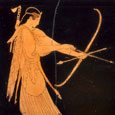 |
ARTEMIS |
ASCALAPHUS (Askalaphos) An underworld spirit who tended the orchards of Hades. When he told his master that Persephone had tasted the seeds of the pomegranate Demeter punished him by turning him into a screech-owl.
ASCANIUS (Askanios) A River of Mysia and its divinity.
ASCLEPIUS (Asklepios) The Greek of medicine. He was a student of the centaur Chiron trained as a physician who became so skilled that he could bring the dead back to life. Zeus struck him dead with a lightning bolt for defying the will of the Fates.
ASCRA (Askre) A Boeotian nymph loved by Poseidon.
ASIA (1) (Asie) The Oceanid wife of the Titan Iapetos who gave her name to the continent.
ASIA (2) (Asie) The Oceanid wife of the Titan Prometheus who gave her name to the continent.
ASOPIS A Naiad daughter of the river Asopus in southern Greece.
ASOPUS (Asopos) A river of Boeotia and Argos in Greece and its watery-god.. He had twenty beautiful daughters, who were all abducted by the gods. When he tried to recover his daughter Aegina from Zeus, he was driven back by the god's thunderbolts.
ASTERIA The Titan goddess of nocturnal rites, and mother of the goddess Hecate. When Zeus chased her, she transformed herself into a quail and leapt into the sea where she became the island of Delos.
ASTERION A river of Mycenae in the southern Greece and its divinity.
ASTERIUS (Asterios) A Lydian giant.
ASTERODEIA A nymph of the Caucasus mountains loved by King Aeetes of Colchis.
ASTEROPE An Oceanid loved by Zeus.
ASTRA PLANETA The gods of the wandering stars known as planets. Hesperus (Venus) was the spirit of the star Venus and Pyroeis or the star we call Mars.
ASTRAEA (Astraia) The Titan-goddess of justice. Astraea withdrew from the earth at the end of the golden age of man to take a place amongst the stars as the constellation Virgo.
ASTRAEUS (1) (Astraios) The Titan-god of the stars, and the arts of astronomy and astrology. He was the father of the spirits of the four Winds and of the Wandering Stars by the dawn-goddess Eos.
ASTRAEUS (2) (Astraios) One of the Sileni, elderly satyrs in the retinue of Dionysus.
ASTRAPE The goddess of lightning, a handmaiden of stormy Zeus.
ASTRIS A daughter of Helius the sun and wife of the Indian river-god Hydaspes.
ASTROTHESIAI The spirits of constellations, mostly mortals granted a place of honour in the heavens.
ASTYOCHE (Astyokhe) A Naiad daughter of the Trojan river Simoeis. She married one of the kings of Troy.
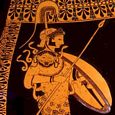 |
ATHENA |
ATHENA (Athene) The Greek goddess of war and skilled crafts, and one of the twelve Olympians. She sprang fully grown and armed from the head of Zeus..
ATLANTEIA A Dryad nymph loved by Danaus, a king of Egypt.
ATLANTEANS (Atlantes) The inhabitants of the lost island of Atlantis.
ATLAS The Titan-god of daring who led the Titan-army in their war against the gods. As punishment he was condemned to carry the dome of heaven upon his shoulders.
ATROPUS (Atropos) One of the three Fates.
ATTIS A eunuch attendant of the goddess Cybele who drove her lion-drawn chariot. Once he had been her lover, but was driven to castrate himself by the goddess when she discovered him in the arms of a nymph.
AUGE The first of the goddesses of the twelve hours, who presided over the hour of dawn's first light.
AULONIADES Dryad-nymphs of the glens.
AURA The Titan-goddess of the breeze who was raped by Dionysus in the mountains of Phrygia.
AURAE (Aurai) Nymphs of the gentle breeze.
AUTOMATONES Animated metal statues of animals and men crafted by the divine smith Hephaistos.
AUXESIA The Hora of spring growth.
AXIUS (Axios) A river of Paeonia and its divinity.
BALANIS The Hamadryad nymph of the acorn tree. BATIA (Bateia) The nymph wife of a king of the Greek city of Sparta.
BALIUS (Balios) An immortal horse given to the hero Peleus as a wedding present by the gods, which his son Achilles later drove in the Trojan War.
BELLEROPHON (Bellerophontes) The Greek hero who tamed the winged horse Pegasus and rode it into battle against the fire-breathing Chimaera.
BENDIS The Thracian goddess of the moon and the hunt who was worshipped with wild Bacchic orgies.
BENTHESICYME (Benthesikyme) A sea-nymph daughter of Poseidon who married one of the kings of Ethiopia.
BEROE The goddess of the Phoenician city of Beruit for whose hand in marriage the gods Poseidon and Dionysus went to battle.
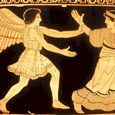 |
BOREAS |
BLEMMYAE (Blemmyai) A fabulous tribe of headless African men with their faces set upon their chests.
BOLBE The nymph of a Boeotian lake called Bolbe.
BOLINA A maiden who fled the amorous embrace of the god Apollo, leapt into the sea and was transformed into an immortal nymph.
BOOTES The agricultural god of the plough who also invented the wagon.
BOREAS The purple-haired, winged god of the north wind and the chill and snows of winter.
BRIAREUS (Briareos) One of the hundred-handed Hecatoncheires who dwelt beneath the sea beside the palace of Poseidon. He came to the aid of Zeus when the other gods rebelled against their king.
BRITOMARTIS A maiden goddess of the nets and fast companion of Artemis. She was once pursued by Minos king of Crete and leapt into the sea to escape his embrace where she was saved in the nets of fishermen.
BRIZO A goddess of the island of Delos, a patron of fishermen, and sender of oracular visions in dreams.
BRONTES One of the three metal-working Cyclopes who crafted the lightning bolts of Zeus.
BRYCHON A River of the Thracian Chersonese and its fish-tailed divinity who allied with the Gigantes in their war against the gods.
BYBLIS A princess of Caria who was transformed into a Hamadryad by the Nymphs of the mountain when she cast herself off a mountain in despair.
BYTHOS One of the Ichthyocentaurs, or fish-tailed centaurs, who carried the goddess Aphrodite ashore after her birth inthe sea foam.
BYZE A Naiad daughter of the Greek river Erasinus who attended the goddess Britomartis.
CAANTHUS (Kaanthos) A son of the Titan Oceanus who was slain by Apollo in their contest for the love of a nymph named Melia.
CABEIRI (Kabeiroi) The gods of forged agricultural implements who presided over the Cabeirian Mysteries of the Greek island of Samothrace.
CABEIRIDES (Kabeirides) Nymphs of the Cabeirian Mysteries of the Greek island of Samothrace.
CABEIRO (Kabeiro) A sea nymph loved by the divine smith Hephaestus.
CACIA (Kakia) The female personification of vice.
CACUS (Kakos) A fire-breathing Italian giant slain by Heracles.
CADMILUS (Kadmilos) A rustic who fathered the Cabeiri twins.
CAECIUS (Kaikias) The spirit of the north-east wind.
CAECUS (Kaikos) A river of Teuthrania and its watery spirit.
CAERUS (Kairos) The Greek god of opportunity.
CALIADNE (Kaliadne) An Egyptian Naiad.
CALOCAGATHIA (Kalokagathia) The female personofication of nobility.
CALLIGENEIA (Kalligeneia) The nurse of Persephone and a goddess of the Eleusinian Mysteries.
CALLIOPE (Kalliope) The eldest of the Muses who presided over the art of epic poetry.
CALLIRHOE (1) (Kallirhoe) The Oceanid wife of the giant Chrysaor who begged her son Geryon not to battle Heracles.
CALLIRHOE (2) (Kallirroe) A Naiad daughter of the river Achelous who married the hero Alcmaeon. She demanded the famed necklace of Harmonia from her husband for a bridal gift, a request which was to doom him and their descendants both.
CALLIRHOE (3) (Kallirhoe) A Naiad daughter of the river Scamander who married one of the kings of Troy.
CALLISTE (Kalliste) A sea-nymph daughter of the fish-tailed Triton and goddess of the island of Calliste.
CALLITHYIA (Kallithyia) A Naiad daughter of the river Inachus who founded the ancient cult of Hera in Argos in southern Greece.
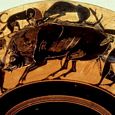 |
CALYDONIAN BOAR |
CALYDONIAN BOAR (Hus Kalydonios) A giant boar sent by Artemis to ravish the land of Aetolia after being offended by its king. It was slain by a band of mighty heroes led by Meleager.
CALYPSO (Kalypso) The goddess-nymph of the island Ogygia who detained the hero Odysseus for many years.
CAMARINA (Kamarina) An Oceanid who gave her name to the Italian city of Camarina.
CAMPE (Kampe) A servant of the Titans set to guard the Tartarean prison of the Hecatoncheir and Cyclop giants. Zeus slew her to free them from the jail.
CAPHEIRA (Kapheira) A sea-nymph who nursed the infant Poseidon in the deep.
CARCINUS (Karkinos) A giant crab which fought beside the Hydra in its battle with Heracles. The hero crushed the creature beneath his foot, but Hera rewarded it with a place amongst the stars as the constellation Cancer.
CARMANOR (Karmanor) A Cretan harvest-god loved by the goddess Demeter.
CARME (Karme) A Cretan nymph of the summer harvest.
CARMENTIS (Karmentis) An Arcadian Naiad loved by the god Hermes whose son Evander emigrated to Latium in Italy.
CARPI (Karpoi) The gods of the fruits of the earth which appear as infants frolicking in the company of the goddess Earth..
CARPO (Karpo) One of the Horae (Seasons) and the goddess of ripened fruit.
CARYA (Karya) The Hamadryad nymph of the hazel or the walnut tree.
CARYSTUS (Karystos) A rustic spirit of the Greek island of the Euboea, son of the centaur Chiron.
CASTALIA (Kastalia) A Naiad daughter of the river Achelous in Greece who presided over a sacred spring at the shrine of Delphi.
CAUCASIAN EAGLE (Aetos Kaukasios) An eagle sent by Zeus to gnaw on the ever-regenerating liver of the Titan Prometheus. It was destroyed by Heracles when he came to free the Titan from his torments.
CAYSTER (Kaystros) A river of Lydia and its watery spirit.
CEBREN (Kebren) A river of Troy and its divinity.
CECROPS (Kekrops) An earth-born king of Attica in Greece born with the tail of a serpent in place of legs.
CEDALION (Kedalion) A daemon attendant of Hephaestus who worked in the smith's forge.
CELAENO (1) (Kelaino) One of the starry Pleiad nymphs who was loved by the god Poseidon.
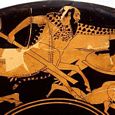 |
CENTAUR |
CELEDONES (Keledones) Magical singers crafted by Hephaestus out of solid gold to serve at the great temple of Apollo at Delphi.
CELMIS (Kelmis) One of the Dactyls.
CELUSA (Kelouse) The nymph mother of the river-god Asopus by Poseidon.
CENTAURIDES (Kentaurides) Females of the Thessalian tribe of centaurs.
CENTAURS (1), THESSALIAN (Kentauroi Thessalioi) A tribe of wild beasts with the upper bodies of men and lower forms of horses. They once tried to abduct the bride of Peirithoos from the wedding feast and were destroyed in the battle with the Lapiths which ensued.
CENTAURS (2), PELOPONNESIAN (Kentauroi Pelopponesioi) A trbe of centaurs who battled Heracles over the wine of their brother Pholus.
CENTAURS (3), CYPRIAN (Kentauroi Kyprioi) A tribe of bull-horned Centaurs from the island of Cyprus. They were born when Zeus impregnated the Earth during an attempted rape of the goddess Aphrodite.
CENTAURS (4), LAMIAN (Pheres Lamioi) Centaur-companions of Dionysus. They were the sons of his nurses, the nymphs Lamides, who were appointed to guard the young divinity by Zeus. Hera gave them their beastly form as punishment.
CEPHISUS (1) (Kephisos) A river of Phocis and Boeotia in southern Greece and its divinity.
CEPHISUS (2) (Kephisos) A river of Attica in Greece and its fish-tailed spirit.
CEPHISUS (3) (Kephisos) The spirit of a river in Argos in Greece whose streams were dried up by . Poseidon when he awarded the land to Hera.
CERAON (Keraon) The daemon of mixing wine.
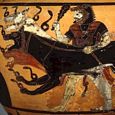 |
CERBERUS |
CERCOPES (Kerkopes) Monkey-like twin sons of the river Oceanus which bothered the lands of Lydia with their banditry. Herakles once captured the pair but they so amused him with their jokes that he let them go free.
CERYNITIAN HIND (Elaphos Kerynitis) A golden-horned deer sacred to the goddess Artemis which Heracles was sent to fetch as one of his Twelve Labours.
CETEA (Ketea) Monsters or dragons of the sea. The smaller types acted as mounts for the sea-gods and nymphs, the larger ones were sent by the marine divinities to punish men.
CETO (1) (Keto) An ancient goddess who personified the many dangers of the sea. Her brood included the Gorgons, the Graea and the monster Scylla.
CETO (2) (Keto) An Oceanid nymph loved by Helius the sun.
CETUS (1), ETHIOPIAN (Ketos Aithiopios) A sea monster sent by Poseidon to ravage the lands of Ethiopia. The hero Perseus slew the monster and rescued the sacrificial princess Andromeda from her chains.
CETUS (2), TROJAN (Ketos Troias) A sea monster sent by Poseidon to plague the lands of Troy. Heracles destroyed it with his arrows, and saved the king's daughter Hesione from her chains.
CEUTHONYMUS (Keuthonymos) A mysterious daemon of the underworld.
CHALCOTAURI (Khalkotauroi) Fire-breathing, bronze bulls which King Aeetes of Colchis commanded Jason to yoke and plow a field with dragon's teeth.
CHALCIS (Khalkis) A Naiad daughter of the river Asopus after whom the Euboean town of Chalcis was named..
CHAOS (Khaos) The primordial spirit of the "gap" or airy void which spans the distance between heaven and earth.
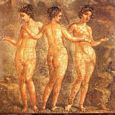 |
CHARITES |
CHARICLO (2) (Khariklo) The Nymph mother of the seer Teiresias and friend of the goddess Athena.
CHARITES (Kharites) The goddesses of the three graces - beauty, mirth and festive good-cheer.
CHARON (Kharon) An underworld daemon who ferried the spirits of the dead across the river Acheron.
CHARYBDIS (Kharybdis) A gigantic daughter of Poseidon who was chained to the sea-bed as punishment for a crime. Her inhallations formed a massive whirlpool, a terror for the sailors travelling her narrow straight.
CHELONE (Khelone) An Oread nymph who haughtily refused to attend the wedding feast of Zeus and Hera. She was transformed into a tortoise for punishment.
CHIMERA (Khimaira) A creature with the fore-quarters of a lion, the rear end of a goat, a goats head on its back, and a fanged serpent-head for a tail. It was slain by the hero Bellerophon who rode into battle on the back of the winged horse Pegasus.
CHIONE (1) (Khione) The goddess of snow, a daughter of the frosty north-wind Boreas.
CHIONE (2) (Khione) A snow-nymph loved by the north-wind Boreas.
CHIONE (3) (Khione) A Naiad daughter of the River Nile. Zeus took pity on her when she was raped by a peasant and transformed her into a cloud, which snowed down upon the desert.
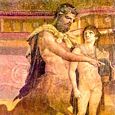 |
CHIRON |
CHLORIS (Khloris) The goddess of flowers and wife of Zephyrus the west wind.
CHREMETES (Khremetes) A river of Libya and its divinity.
CHRONUS (Khronos) The primordial spirit of time whose serpentine form was entwined with the form of Ananke, the goddess of necessity.
CHRYSAOR (Khrysaor) A gigantic winged son of the Gorgon Medusa.
CHRYSEAN DOG (Khryseos Kuon) A golden hound set by Rhea set to guard the infant Zeus and his nurse the goat Amaltheia.
CHRYSOMALLUS (Khrysomallos) A flying, golden-fleeced ram sent by the cloud-nymph Nephele to rescue her childre,n Phrixus and Helle, from sacrifice.
CHRYSOPELIA (Khrysopeleia) The nymph wife of Arcas, an early king of Arcadia in Greece.
CHRYSOTHEMIS (Khrysothemis) The goddess of the golden-rites of the grain harvest.
CHRYSUS (Khrysos) The god of golden riches.
CIRCE (Kirke) An immortal witch who lived on the island of Aeaea where she transformed travellers into beasts with her potions and spells.
CITHAERON (Kithairon) A ancient, craggy spirit of Mount Cithaeron in southern Greece.
CLAEA (Klaia) A Messenian Oread nymph who possessed a shrine on Mount Calathium in the south of Greece.
CLAZOMENAEAN BOAR (Hus Klazomenaios) A gigantic winged boar which terrorized the Ionian town of Clazomenae.
CLEEIA (Kleeia) One of the starry Hyad nymphs.
CLEOCHARIA (Kleokhareia) A Naiad nymph and wife of Lelex, first king of Sparta in the south of Greece.
CLEODORA (Kleodora) A nymph of Mount Parnassus loved by Poseidon.
CLEOMEDE (Kleomede) A nymph of the river Axius loved by King Paeonus of Paeonia.
CLEONE (Kleone) A Naiad nymph of the town of Cleonae in Argos.
CLIO (Kleio) The goddess Muse of history.
CLONIA (Klonie) A Boeotian nymph of the town of Hyria.
CLOTHO (Klotho) One of the three Fates.
CLYMENE (1) (Klymene) The Titan goddess of fame and infamy. She was Oceanides and the wife of the Titan Iapetus.
CLYMENE (2) (Klymene) An Oceanid nymph loved by the sun-god Helios who bore him Phaethon and the Heliad nymphs.
CLYTIA (Klytia) An Oceanid nymph loved by Helius the sun. When he abandoned her for another, she pined away and was transformed into a sun-gazing heliotrope flower.
CLYTIUS (Klytios) One of the Gigantes who was slain by Hecate in the Giant War with her flaming torches.
CNOSSIA (Knossia) A nymph of the Cretan town of Cnossus loved by King Menelaus of Sparta.
COALEMUS (Koalemos) The personification of stupidity.
COCYTHIAE (Kokythiai) Naiad nymph daughters of the underworld river Cocytus.
COCYTUS (Kokytos) The underworld river of wailing and its divinity
COEUS (Koios) The Titan-god of intelligence who presided over the axis of heaven.
COMBE (Kombe) A rustic nymph of the island of Euboea, mother of the Euboean Corybantes.
COMUS (Komos) The Greek god of banquets and festivity.
CONISALUS (Konisalos) A phallic daemon of garden fertility.
CORCYRA (Korkyra) A Naiad daughter of the river Asopus abducted by Poseidon to the island of Corcyra.
CORONIDES (Koronides) Twin daughters of the Giant Orion who saved the city of Orchomeus from plague by offering themselves up as a sacrifice to the gods. Persephone pitied their fate and transformed the pair into comets.
CORONIS (Koronis) One of the starry Hyades.
CORUS (Koros) The personification of disdain.
CORYBANTES (1), PHRYGIAN (Korybantes Phrygioi) Divine attendants of the goddess Cybele which celebrated her rites with a dance of clashing shield and spear.
CORYBANTES (2), SAMOTHRACIAN (Korybantes Samothrakioi) Daemones of the orgiastic dance of the Samothracian mysteries.
CORYBANTES (3), EUBOEAN (Korybantes Euboiai) Curete-like daemones of the island of Euboea in Greece.
CORYCIA (Korykia) A Corycian nymph of Delphi in central Greece loved by Apollo.
CORYCIAE (Korykiai) Naiad daughters of the river Pleistus which tended the springs of the sacred Corycian cave on Mount Parnassus.
CORYMBUS (Korymbos) The rustic spirit of ivy wreaths worn by celebrants of the Bacchic orgies..
COTTUS (Kottos) One of the hundred-handed, fifty-headed Hecatoncheir giants.
COTYS (Kotys) A wild Bacchic goddess of Thrace.
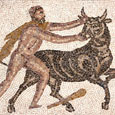 |
CRETAN BULL |
CRATAEIS (Krataeis) The mother of the monster Skylla.
CRATUS (Kratos) The daemon (spirit) of strength who guarded the throne of Zeus.
CRENAEAE (Krenaiai) Naiad-nymphs of fountains.
CRES The earth-spirit of the island of Crete.
CRETAN BULL (Tauros Kretaios) A bull sent forth from the sea by Poseidon. It impregnated Pasiphae, the wife of king Minos of Crete, who afterwards gave birth to the Minotaur. Heracles was later sent to fetch it as one of his Twelve Labours.
CRETHEIS (Kretheis) A Naiad nymph of the Lydian town of Smyrna who, according to legend, was the mother of Homer by the river-god Meles.
CREUSA (Kreousa) The Naiad nymph wife of the river Peneus in northern Greece.
CRINAEAE (Krinaiai) Naiad-nymphs of fountains.
CRIUS (Krios) The Titan-god of mastery, leadership and the constellations who was imprisoned in Tartarus with his brothers by the gods.
CROCALE (Krokale) One of the attendant nymphs of the goddess Artemis.
CROMMYON SOW (Hus Krommyon) A giant boar sent by the gods to ravage the farmlands of Crommyon. It was slain by Theseus.
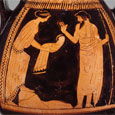 |
CRONUS |
CROTUS (Krotos) A satyr companion of the nine Muses who was placed amongst the stars as the constellation Saggitarius.
CTESIUS (Ktesios) The friendly daemon (spirit) of the household.
CURETES (Kouretes) Servants of Rhea who helped to conceal the infant Zeus from Cronus by dancing about with a clash spear and shield to drown out his cries.
CYAMITES (Kyamites) The bean-man, a minor divinity of the Eleusinian Mysteries.
CYANE (1) (Kyane) The Naiad nymph of a spring near Syracuse in Sicily. Hades violated her waters in the abduction of Persephone she was transformed into pure liquid.
CYANE (2) (Kyane) A nymph and the wife of Aeolus, king of the winds.
CYANEE (Kyanee) The Naiad nymph of the springs of the Carian town of Miletus who was the wife of the town's founding hero Miletus.
CYBELE (Kybele) The Phrygian mother of the gods, identified by the Greeks with Rhea.
CYCLOPES (1), ELDER (Kyklopes) Three one-eyed giants which were imprisoned in Tartarus first by their father Uranus and then by Cronus. Zeus rescued them during the Titan-War and they crafted for him his thunderbolts, for Hades a helm of invisibility, and for Poseidon an earth-quaking trident.
CYCLOPES (2), YOUNGER (Kyklopes) A primitive and lawless band of one-eyed, cannibal giants which dwelt on the island of Hypereia. They were encountered by Odysseus during his travels.
CYDNIDES (Kydnides) Warlike Cicilian Naiads who fought for Dionysus in his Indian War.
CYDOIMUS (Kydoimos) The personification of confusion, a daemon of the battlefield.
CYLLENE (Kyllene) A nymph of Mount Cyllene and wife of King Pelasgus of Arcadia.
CYMOPOLEA (Kymopoleia) The goddess of the waves, a daughter of Poseidon, and wife of the . hundred-handed giant Briareus.
CYNOCEPHALI (Kunokephaloi) A tribe of dog-headed men which lived in the wilds of north Africa or India.
CYRENE (Kyrene) A Naiad nymph huntress of Thessalian mountains. She bore Apollo a divine son named Aristaeus.
CYTHERUS (Kytheros) A river of Elis in southern Greece and its spirit.
DACTYLS (Daktyloi) Magician-smiths of the Greek island of Crete in the service of the goddess Rhea. DAEIRA A goddess nymph of the Eleusinian mysteries.
DAEMONAE (Daimonai) The female daimones or sprits, including nymphs, and various female personifications and abstractions such as Strife and Luck.
DAEMONES (Daimones) Spirits of the air, earth, sea and underworld. They included personifications such of Elpis (Hope), nature spirits like the river-gods and nymphs.
DAEMONES, AGATHI (Daimones Agathoi) Good spirits which protected and bestowed blessings on mankind.
DAEMONES ARGYREAN (Daimones Argyreoi) The men of the silver age who were immortalised as underground spirits responsible for the earth's fertility.
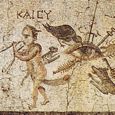 |
CACODAEMON |
DAEMONES CHRYSEAN (Daimones Khryseoi) The men of the golden age who were immortalised as thirty thousand earth-dwelling spirits which watched over and protected mankind.
DAEMONES CHTHONIAN (Daimones Khthonioi) The daemon-spirits of the underworld.
DAEMONES GEORGICI (Daimones Georgikoi) The spirits of agriculture and farming
DAEMONES HALIAN (Daimones Halioi) The spirits of the sea.
DAEMONES NOMIAN (Daimones Nomioi) The spirits of the countryside, pastureland and wilds.
DAEMONES URANIAN (Daimones Ouranioi) The spirits of the sky.
DAEMONES PROSEOUS (Daimones Proseoos) Evil demons which haunted the dark, coastal caverns ringing the island of Rhodes.
DAMASEN A giant who slew a fearsome dragon terrorising the kingdom of Lydia.
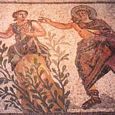 |
DAPHNE |
DAMNAMENEUS One of the metal-working Dactyls.
DAMYSUS (Damysos) The swiftest of the Gigantes which fought against the gods in the Giant War. Chiron extracted the swiftness from his foot and placed it in the heel of Achilles.
DANAIS A nymph of Elis in southern Greece loved by King Pelops of Pisa.
DAPHNE A Naiad daughter of the river Peneius who was chased through the woods by amorous god Apollo. Just as he was about to capture her she was transformed into a laurel tree.
DAPHNAIE Dryad-nymphs of the laurel-tree.
DAPHNIS (1) An Oread nymph who prophesied at the Oracle of Delphi in the service of Gaea, before Apollo took over the shrine.
DAPHNIS (2) The deity of idyllic poetry.
DAULIS A Naiad nymph who gave her name to the town of Daulis in central Greece.
DEIMUS (Deimos) The daemon of terror, an attendant of the war-god Ares.
DEINO (1) One of the Graeae, hags which shared just one eye and one tooth amongst them.
DEINO (2) The Naiad nymph wife of the River Spercheius in northern Greece.
DEIPNEUS The daemon of the making of meals.
DELPHIN (Delphin) A divine dolphin who helped Poseidon track down the goddess Amphitrite and persuade her to marry to him. As reward for his service, Poseidon placed him amongst the stars as the constellation Delphinus.
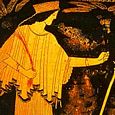 |
DEMETER |
DEMETER The great Olympian goddess of agriculture and the fertile earth. Her Mysteries promised mankind a passage to the blessed afterlife.
DERCETIS (Derketis) A Naiad nymph of Boeotia in central Greece who ravished a local shepherd boy.
DESPOENA (Despoine) A mysterious goddess born from Poseidon's rape of Demeter in the form of the horse. Her true name was a secret only revealed to initiates of her cult.
DICAEOSYNE (Dikaiosyne) The personification of equity.
DICE (Dike) The goddess of justice, one of the three Horae (Seasons).
DICTYNNA (Diktynna) The goddess of the nets, also known as Britomarttis.
DIOGENIA (Diogeneia) A Naiad daughter of the river Cephisusin southern Greece who married an Athenian nobleman.
DIONE (1) A Titan goddess who presided over the oracle of Dodona in northern Greece. According to some she was the mother of Aphrodite by Zeus.
DIONE (2) A star-nymph daughter of the Titan Atlas who was married to the impious Lydian King Tantalus.
DIONYSUS (Dionysos) The god of wine and festivity, youngest of the twelve Olympians.
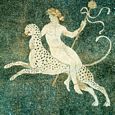 |
DIONYSOS |
DIOSCURI (Dioskouroi) Demi-god twins who came to the aid of sailors caught out at sea in a storm. They appeared in the form of Saint Elmo's fire. The twins were once mortal princes, who were granted immortality and placed amongst the stars as the constellation Gemini as reward for their heroism.
DIRCE (Dirke) The Naiad nymph of a fountain sacred to Dionysus on Mount Cithaeron in the south of Greece.
DODONA (Dodone) An Oceanid nymph who gave her name to the town and shrine of Dodona in Thesprotia in northern Greece.
DODONIDES Prophetic Dryad nymphs which inhabited the oak trees at the oracle of Zeus at Dodona in the northern mountains of Greece.
DOLUS (Dolos) The male personification of trickery and deceit. He was an apprentice of the Titan Prometheus, who manufactured a maiden of lies as an identical twin to Prometheus' maiden of truth.
DORIS The Oceanid goddess of the fresh water mingling with the brine. She was the wife of the sea-god Nereus and mother of the fifty Nereides.
DRACAENAE Drakainai) She-demons with the upper bodies of beautiful women and the coiled tail of a serpent in place of legs.
DRACAENA OF SCYTHIA (Drakaina Skythia) An earth-daemon queen of Scythia with the tail of a serpent in place of legs. She stole the cattle of Heracles and demanded that the hero mate with her before she would return them.
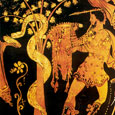 |
DRACON COLCHIS |
DRACON CYCHREIDES (Drakon Kykhreides) A giant drakon driven from the Greek island of Salamis by the hero Cychreus. It fled to Eleusis where Demeter welcomed and made it her attendant.
DRACON OF COLCHIS (Drakon Kholkidos) A giant sleepless dragon which guarded the Golden Fleece hung from a tree in Colchis. It was defeated by the heroes Jason and Medea.
DRACON OF THE GIANT-WAR (Drakon Gigantomakhios) A giant serpent wielded by a Gigante during the Giant War. Athena caught it up and tossed it into the heavens to form the constellation Draco.
DRACON OF HESPERIA (Drakon Hesperios) A hundred-headed dragon which guarded the golden apples of the Hesperides. It was slain by Heracles who was sent to fetch these as one of his Twelve Labours.
DRACON OF LYDIA (1) (Drakon Maionios) A giant Lydian serpent slain by Heracles in the service of Queen Omphale.
DRACON OF LYDIA (2) (Drakon Maionios) A massive serpent destroyed by the Lydian giant Damasen. After its death, the monster's mate came and restored it to life with a magical herb.
DRACON OF NEMEA (Drakon Nemeios) A giant serpent which guarded the sacred grove of Zeus in the Greek town of Nemea. During the War of the Seven Against Thebes it killed the infant Opheltes, and was destroyed by the heroes of the campaign.
DRACON OF THE OPHIOGENES (Drakon Ophiogeneikos) A Mysian dragon which impregnated a girl in a shrine of the goddess Artemis. She then gave birth to Ophiogenes (Serpent-Born), the ancestor of a tribe of men immune to the venom of serpents.
DRACON OF PITANE (Drakon Pitanios) A dragon turned to stone by the gods near Pitane in Aeolia in the heart of Greece.
DRACON OF THEBES (Drakon Ismenios) A dragon which guarded the sacred spring of Ares at Thebes, slain by the hero Cadmus when he was founding the city. Sowing its teeth into the ground he harvested a crop of warrior-men.
DRACON OF THESPIA (Drakon Thespiakos) A dragon which ravaged the village of Thespia in Boeotia, Greece. The hero Menostratus defeated it by throwing himself into its jaws wearing a suit of spiked armour.
DRACONES OF DEMETER (Drakones) A pair of winged serpents which drew the flying chariot of the goddess Demeter and her hero Triptolemos.
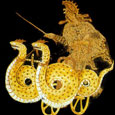 |
DRACONS MEDEA |
DRACONES OF RHODES (Drakones Rhodioi) A giant dragon and its spawn which infested the Greek island of Rhodes. The beasts were destroyed by the hero Phorbas and the island freed.
DRACONES OF TROY (Drakones Troiades) Two giant sea-serpents sent by Poseidon to silence the Trojan priest Laocoon when he was about to warn the Trojans about the ruse of the Wooden Horse.
DRYADS (Dryades) Nymphs of the trees. The Oread Dryad inhabited oaks and pines, while the Meliae were creatures of the mountain-ash.
DRYOPE A Dryopian princess who was transformed into a Hamadryad by the Nymphs.
DYSAULES A divinity of the Eleusinian Mysteries who presided over the ploughing of fields.
DYSIS The eleventh of the twelve Horae, goddesses of the hours, who presided over the hour of sunset.
DYSNOMIA (Dysnomia) The female personification of lawlessness.
ECECHERIA (Ekekheria) The female personification of truce. ECHIDNA (1) (Ekhidna) A deadly she-dragon with the upper form of a beautiful nymph, and the tail of a writhing serpent in place of legs. She mated with the hundred-headed giant Typhon and spawned a brood of terrible monsters.
ECHIDNA (2) (Ekhidna) An Arcadian she-dragon slain by the hero Argos Panoptes.
ECHIDNADES (Ekhidnades) A serpent-footed ally of the Titans slain by Ares in the Titan-War.
ECHO (Ekho) An Oread attendant of Hera who distracted the goddess with endless chatter while her husband Zeus was having affairs with other women. Hera caught onto the ruse and took away the nymph's voice, cursing her to repeat the last words of others. Echo later fell in love with the boy Narcissus, but was spurned and in her grief, wasted away until only her echoing voice was left..
EIDOTHEA (1) A sea-nymph daughter of the seal-herder Proteus who helped Menelaus capture the prophetic old sea-god.
EIDOTHEA (2) A nymph of Mount Othrys in the Greek region of Malis loved by the god Poseidon.
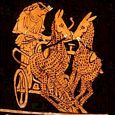 |
GOLDEN HINDS |
EILEITHYIA The Greek goddess of childbirth, a daughter of Zeus and Hera.
EIRENE The goddess of peace, one of the three Horae (Seasons).
ELAPHOI CHRYSOCEROI (Elaphoi Khrysokeroi) Five golden-horned deer sacred to the goddess Artemis. Four of them drew her chariot while the fifth, known as the Cerynitian Hind, roamed free.
ELATREUS One of the metal-working Cyclop giants.
ELECTRA (1) (Elektra) The Oceanid of the amber sun-lit rim of breaking storm clouds, wife of the wondrous sea-god Thaumas and mother of the rainbow Iris and the gusty Harpies.
ELECTRA (2) (Elektra) A Pleiad nymph who was the mother of Dardanus, ancestor of the kings of Troy, by Zeus.
ELETE The eighth of the twelve goddesses of the hours (Horae), who presided over the hour of mid-afternoon.
ELEUS (Eleos) The female personification of mercy.
ELEUSIS The eponymous nymph of Eleusis and the wife of the town's first king. She was one of the attendants of Demeter in the Mysteries.
ELPIS The female personification of hope, the only spirit to remain trapped inside Pandora's box.
EMPUSA (Empousa) An underworld she-daemon with flaming hair, a leg of brass, and the leg of an ass who terrorized men in the dark of night.
ENCELADUS (Enkelados) A Gigante crushed by Athena beneath the island of Sicily during the Giant War. His restless turnings fed the fires of volcanic Mount Etna.
ENDEIS A Nymph daughter of the centaur Chiron who some say was the mother of the hero Peleus.
ENDYMION A young shepherd loved by the moon-goddess Selene who granted his wish for immortality in a state of eternal slumber.
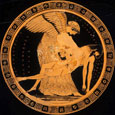 |
EOS |
ENYO (1) The goddess of war, a battlefield companion of Ares.
ENYO (2) One of the Graeae, old hags who shared one eye and one tooth amongst them.
EOS The Greek goddess of the dawn who was cursed by Aphrodite with an insatiable appetite for men, falling in love with one after another - Cephalus, Tithonus, Phaethon and Orion.
EOSPHORUS (Eosphoros) The divinity of the morning star (Venus), herald of the dawn.
EPHIALTES (1) A Gigante shot in both eyes by Apollo and Heracles with arrows during the Giant War.
EPHIALTES (2) A giant son of Poseidon who with his twin brother Otus tried to storm the heavens by piling three mountains one upon the other, until they were destroyed by Apollo and Artemis.
EPHYRA The eponymous Oceanid nymph of the town of Ephyra (Corinth), in the south of Greece.
EPIALES The underworld daemon of nightmares.
EPIDOTES The daemon of the rites of purification. She was an attendant of Apollo at the Greek shrine Delphi who molified the wrath of the Furies.
EPIMELIDES Rustic nymphs responsible for protecting sheep flocks and apple orchards.
EPIMETHEUS The Titan-god of afterthought who foolishly accepted the first woman, Pandora, from the godswith her box of evils.
EPIONE The goddess of the soothing of pain, wife of the divine physician Asclepius.
EPIPHRON The Greek personification of shrewdness and careful consideration.
ERASINUS (Erasinos) A river of Argos in southern Greece and its watery spirit.
ERATO (1) The Muse of love poetry.
ERATO (2) An Arcadian Dryad nymph and prophetess of Pan who became the wife of the Arcadian king Arcas.
EREBUS (Erebos) The primordial spirit of darkness, consort of Night, and father of Day and Light..
ERIDANUS (Eridanos) A river of northern Europe or Italy and its fish-tailed deity.
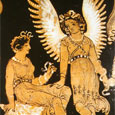 |
ERINYES |
ERIS The goddess of strife and discored who stalked the battlefield. She helped the Trojan War by casting a golden apple addresed "to the fairest" amongst the company of goddesses.
ERITES The twin personifications of strife. The good Eris was represented competitive rivalry while the bad was the spirit of hateful discord.
EROS (1) The protogenos (primordial deity) of sexual desire and procreation. He was one of the first to emerge at creation.
EROS (2) The winged godling of love who struck down men with his love-tipped arrows.
EROTES The winged, child-like gods of love, also known as Cupids.
ERSA (Herse) The goddess of the dew.
ERYMANTHIAN BOAR (Hus Erymanthios) A giant boar which Heracles was sent to fetch as one of his twelve labours.
EUBOEA (1) (Euboia) A Naiad daughter of the river Asopus who was abducted by Poseidon to the Greek island of Euboea.
EUBOEA (2) (Euboia) A Naiad daughter of the river Asterion in the Argive region of southern Greece, who with sisters Acraea and Prosymna, nursed the infantHera.
EUBOLUS (Euboulos) The daemon of the ploughing of the earth, a minor deity of the Eleusinian Mysteries.
EUCLEIA (Eukleia) The goddess of good repute, patron of the young bride..
EUDAEMONIA (Eudaimonia) The goddess of happiness, prosperity and opulence. She was one of the younger Charites (Graces) and a companion of the goddess Aphrodite.
 |
EROS |
EUNOMIA One of the three Horae (Seasons), and goddess of good order and the spring pastures. She was also an attendant of the goddess Aphrodite.
EUNOSTOS (Eunostus) The goddess of the flour mill.
EUPHEME (1) The spirit of eloquence, nurse of the nine Muses and a love of the goat-horned Pan
EUPHEME (2) The personification of eloquence, one of the younger Charites (Graces).
EUPHRATES The deity of the Assyrian River Euphrates.
EUPHROSYNE The ancient Greek goddess of mirth and merriment, one of the three Graces (Charites).
EUPORIA One of the Horae or Seasons, and the goddess of agricultural abundance.
EUPRAXIA The female personification of good conduct.
EUROPA An Oceanid who gave her name to the continent of Europe.
EUROTAS A river in the Greek region of Laconia and its ancient divnity who fathered the first of the kings of Sparta.
EURUS (Euros) The Greek god of the east wind.
EURYALE One of the immortal Gorgons, a sister of Medusa.
EURYALUS (Euryalos) A one-eyed, metal-working Cyclops giant.
EURYBIA The ancient goddess of the power of the sea, wife of the Titan Crius.
EURYMEDON One of the Cabeiri gods.
EURYNOME (1) The Titan goddess of the water pasture, and mother of the Charites (Graces) by Zeus.
EURYNOME (2) A Queen of the Titans, wife of King Ophion. She and her husband were deposed by Cronus and Rhea and cast down from heaven into the Ocean-stream.
EURYNOMUS (Eurynomos) A black-blue skinned daemon of the underworld which devoured the flesh of the dead.
EURYTION (1) A Thessalian centaur who tried to carry off the bride of king Peirithous on her wedding day, sparking a war between the Lapiths and the centaurs.
EURYTION (2) A Peloponnesian centaur killed by Heracles when it came demanding the hand of Mnesimache, princess of Olenus, in marriage.
EURYTUS (Eurytos) A Gigante slain by Dionysus in the Giant War.
EUSEBIA The female personification of piety and filial respect. Her husband was Nomus, the spirit of law.
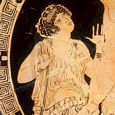 |
GAEA |
EUTHEMIA A nymph of the Greek island of Cos who was struck down by the arrows of Artemis when she refused to honour the goddess.
EUTHENIA The goddess of prosperity, one of the younger Charites, daughters of Hephaestus.
EUTYCHIA The spirit of good fortune.
EVADNE (Euadne) A Aaiad daughter of the river Strymon wed to Argus, the first king of the Argive region in southern Greece.
EVENUS (Euenos) A river of Aetolia in the west of Greece and its divinity.
FATES (Moirai) The three goddesses of fate.
FURIES (Erinyes) The three serpent-haired goddesses of vengeance called Erinyes.
For other Greek names beginning with F look under Ph (eg Phaethon for Faethon, Phorcys for Forcus)
GAAEUS (Gaaeus) One of the fish-tailed marine gods, a herder of the fish of the sea.
GAEA (Gaia) The primordial goddess (protogenia) of the earth, mother of both gods and men. In the ancient tale of divine succession, she first conspired to have her husband Uranus deposed, and afterwards for her son Cronus to be supplanted in turn by Zeus.
GALATEA (Galateia) One of the fifty Nereids, Galatea was wooed by the Cyclops Polyphemus.
GALENE The Nereid nymph of calm seas.
GANYMEDES A handsome prince of Troy abducted to Olympus by Zeus to become the cup-bearer of the gods.
GEGENEES A tribe of six-armed Mysian giants slain by the Argonauts.
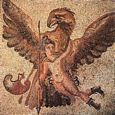 |
GANYMEDES |
GERAS The wrinkled, shrunken old daemon of old age.
GERYON A giant, three-bodied man who possessed a fabulous herd of red-skinned cattle on the Sunset Isle. Heracles slew him when sent to fetch these as his tenth labour.
GIGANTES (1) The giants of Greek myth which included beings like the Gigantes who waged war on the gods, the Aloedae, Typhon, Antaeus, Charybdis, Orion, Tityus, the Cyclopes, and the Hecatoncheires.
GIGANTES (2), HECA- (Heka-Gigantes) A hundred Giants born of Tartarus and Gaea which were incited by their mother to wage war on the gods. They were slaughtered in the furious battle which ensued.
GLAUCIA (Glaukia) A Naiad daughter of the river Scamander of Troy who fell in love with one of the companions of Heracles.
GLAUCUS (Glaukos) A Greek fisherman transformed into a fish-tailed sea-god after tasting a magical herb.
GORGO The primal Gorgon slain by Zeus who crafted the aegis-shield from its skin.
GORGONS (Gorgones) Three monstrous winged she-daemones with snakes for hair, broad, flat noses, wide-staring eyes, protruding tusks and lolling tongues. They had claws of bronze and golden wings and a gaze which would turn man or beast to stone.
GORGYRA A nymph of the underworld, wife of the river of pain, Acheron.
GRACES (Kharites) Goddesses of beauty, joy and happiness called the Charites.
GRAEAE (Graiai) Female daemones of the white froth of the sea, born grey-haired and aged who shared but one and tooth amongst them. Perseus stole these from them to demand they show him the path to the Gorgons.
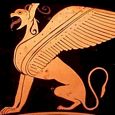 |
GRIFFIN |
GRENICUS (Grenikos) A river of Troy and its deity.
GRIFFINS (Grypes) A fabulous creature with the fore-quarters of an eagle and the rear-part of a horse.
GYES One of the three hundred-handed, fifty-headed Hecatoncheir giants.
GYGE (Gygaie) A lake of Lydia and its watery spirit.
GYMNASTICA (Gymnastika) The fourth of the twelve goddesses of the hours (Horae), who presided over the morning hour set aside for gymnastics.
HADES (Haides) The king of the underworld and lord of the dead. He was one of the three powerful sons of Cronus who, with his brothers Zeus and Poseidon, drew lots for the division of the cosmos after defeating the Titans.
HALIA A sea nymph of the Greek island of Rhodes who bore Poseidon six sons. When these refused Aphrodite port on the island, she caused them to go mad and they raped their own mother. Poseidon then cast them down into caverns beneath the island, while Halia ("brine") leapt into the sea and was dissolved.
HALIAE (Haliai) Nymphs of the sea, daughters of the various marine gods. Amongst their number were the fifty Nereides.
HALIMEDES A one-eyed, metal-working Cyclops giant.
HAMADRYADES (Hamadryades) Tree nymphs whose life was bound to a tree.
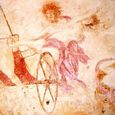 |
HADES |
HARMONIA (1) The Greek goddess of harmony and unity who married the hero Cadmus, king of the Greek city of Thebes, in a wedding attended by all gods. After ruling Thebes for many years the two were transfered to Elysium and a life of eternal bliss.
HARMONIA (2) A nymph of the Acmonian wood who became the mother of the first of the Amazons by Ares.
HARPIES (Harpyiai) Ravenous bird-women, known as the "hounds of Zeus," which caught people away in their whirlwinds, never to be seen again. Once Zeus sent them to torment the impious king Phineus, and they snatched away his food and drink until driven off by the Argonauts.
HARPINA A Naiad nymph daughter of the river Asopus in southern Greece who was carried off to Elis by Ares.
HARPOCRATES (Harpokrates) The young boy-god of silence who held a finger to his lips to insist on quiet.
HEBE The Greek goddess of youth who became the wife of Heracles upon his ascension to Olympus.
HEBRUS (Hebros) A river of Thrace, north of Greece, and its deity.
HECAERGE (Hekaerge) An Hyperborean nymph huntress who accompanied the goddess Artemis.
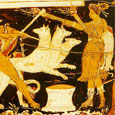 |
HECATE |
HECATERIDES (Hekaterides) Five rustic nymphs who were the mothers of the mountain spirits - the Oreiad nymphs, Satyrs and Curetes.
HECATERUS (Hekateros) A rustic spirit of the country dance.
HECATONCHEIRES (Hekatonkheires) Three fifty-headed, hundred-handed giants which were the force behind violent storms. They were imprisoned beneath the earth by their father Uranus, then their brother Cronus, until finally released by Zeus who called upon their strength in the Titan War.
HEDONE The spirit of pleasure, a daughter of Eros (Love) and Psyche (the Soul).
HEDYLOGUS (Hedylogos) The daemon of sweet-talk, one of the winged Erotes (Love-Spirits).
HEGETORIA A nymph of the Greek island of Rhodes who wed its king Ochimus.
HELEIONOMAE (Heleionomai) Naiad-nymphs of marshes.
HELIADES Beautiful nymph daughters of the sun-god Helius who were transformed into amber-weeping poplar trees when they stood in grief mourning the death of their brother Phaethon, cast to his death from the chariot of the sun.
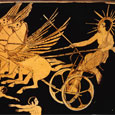 |
HELIUS |
HELIUS (Helios) The solar-god who drove a chariot of winged horses across the sky wearing the shining aureole-crown of the sun upon his head.
HELLE The goddess of the Hellespont Sea which divides the continents of Europe and Asia. She was once a mortal girl who had fled from her homeland in Greece on the back of a golden-fleeced ram, but losing her grip slipped into the sea where she was transformed into a goddess by Poseidon..
HEMERA (Hemere) The primordial goddess (protogenia) of the day, a daughter of Night and Darkness and sister of Light.
HEMITHEA A goddess of the Asian Chersonnese. Once a mortal princess of the Greek island of Delos, she leapt into the sea to escape the wrath of her father where she was transformed into a divinity by Apollo.
HEPHAESTUS (Hephaistos) The crippled Greek god of fire, volcanism, smiths and craftsmen, and one of the twelve great Olympian gods.
HERA The queen of the gods, and goddess of heaven, women and marriage. She was one of the the twelve great Olympians who ruled the cosmos.
HERACLES (Herakles) The greatest of all the Greek heroes who was famed for the completion of the Twelve Labours. Upon his death he ascended to Olympus to join the ranks of the gods, and was thereupon titled the protector of man.
HERCYNA (Herkyna) A nymph of Boeotia in central Greece who was a companion of the goddess Persephone.
HERMAPHRODITUS (Hermaphroditos) A handsome son of Hermes and Aphrodite who was desired by the nymph Salmacis. She prayed that they might forever be together, and some deity answered by merging their forms into one, creating the first hermaphrodite - a creature part male and part female. As a minor divinities he-she was numbered amongst the Erotes (Love-Spirits).
HERMES The great Olympian god of animal husbandry, fertility of the herds, trade, messengers, travel, merchants and athletes. He was also the personal herald of Zeus, king of the gods.
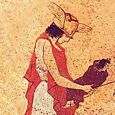 |
HERMES |
HEROPHILE A daughter of Poseidon and Aphrodite.
HESIONE The Oceanid nymph wife of the Titan Prometheus.
HESPERIA A Naiad daughter of the Trojan river Cebren.
HESPERIDES Goddess-nymphs of the evening and sunsets. The lived on the Red Isle in the westernmost corner of the world where they tended the tree of golden apples.
HESPERIS The tenth of the twelve goddesses of the hours, or Horae, who presided over the hour of dusk.
HESPERUS (Hesperos) The deity of the evening star (Venus), herald of the evening.
HESTIA The Greek goddess of hearth and home, a virgin goddess, sister of Zeus and one of the twelve great Olympian gods.
HESYCHIA (Hesykhia) The female personification of quiet and tranquility.
HIEROMNEME A Naiad nymph daughter of the Trojan river Simoeis who wed a Dardanian prince named Assaracus.
HILAEIRA One of the Leucippides, two princesses of Messenia in southern Greece, who became the goddess-wives of the Dioscuri twins.
HIMALIA A nymph of the Greek island of Rhodes seduced by Zeus when he was on the island battling the evil of the Telchines.
HIMERUS (Himeros) The daemon (spirit) of sexual desire, one of the winged Erotes (Love-Spirits). He appeared at the birth of Aphrodite and became one of her constant companions.
HIPPALECTRYON (Hippalektryon) A strange flying beast with the fore-quarters of a horse and the wings and rear-parts of a rooster.
HIPPOCAMPI (Hippokampoi) A fabulous marine creature with the fore-parts of a hrose and the rear-quarters of a fish. Hippocampi drew the chariot of Poseidon and were ridden as mounts by other marine gods.
HIPPOI ATHANATOI Immortal horses, children of the Winds, which drove the chariots of the gods. A few fortunate heroes also received them as gifts.
HIPPOLYTUS (Hippolytos) A Gigante slain by Hermes with his sword in the Giant War.
HOMADUS (Homados) The male personification of battlenoise.
HOMONOIA The female personification of concord and unity.
HOPLODAMUS (Hoplodamos) The leader of the Curetes or Gigantes who protected Rhea from the wrath of Cronus after she had hidden away their child Zeus.
HORAE (1) (Horai) Goddesses of the seasons and the heavenly measures of time. They presided over the facets of order - peace, justice and good governance.
HORAE (2) (Horai) Goddesses of the twelve hours of day.
HORCUS (Horkos) The male personification of the binding oath who punished the oath-breaker.
HORMES The male personfication of effort.
HYADES Five nymphs, daughters of the Titan Atlas, who nursed the infant Dionysus. They were set amongst the stars as the constellation Hyades, whose rising marked the arrival of the spring rains.
HYALE One of the attendant nymphs of the goddess Artemis.
HYAS A water-bearing son of the Titan Atlas who was killed by a lion and placed amongst the stars as the constellation Aquarius.
HYBRIS The female personification of insolence and excessive pride.
HYDASPES An Indian river-spirit who was defeated in battle by Dionysus during the Indian War.
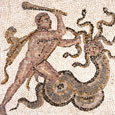 |
HYDRA |
HYDRUS (Hydros) The progotenos (primordial deity) of fresh water.
HYGEIA The goddess of good health.
HYLLUS (Hyllos) A Lydian giant.
HYLONOME A female centaur who killed herself when her husband the centaur Cyllarus was slain in the battle with the Lapiths.
HYMENAEUS (Hymenaios) The spirit of the wedding ceremony and bridal hymn, who was numbered amongst the Erotes (Love-Deities).
HYPERBOREAN GIANTS (Gigantes Hyperboreioi) Three giant sons of the North-Wind who were the priests of the fabulous Hyperborean tribe of the far north.
HYPBERBOREANS (Hyperboreoi) A tribe of blessed men favoured by Apollo who dwelt in a land of eternal spring far beyond the wintry moutains of the North-Wind.
HYPERIA (Hypereia) A Naiad nymph daughter of the river Inachus in southern Greece.
HYPERION One of the six elder Titans, who represented the light of heaven and the cosmic ordering of days and months.
HYPNUS (Hypnos) The winged daemon (spirit) of sleep.
HYSMINAE (Hysminai) The personifications of fighting, ruthless spirits of the battlefield
IACCHUS(Iakkhos) A torch-bearing deity of the processions of the Eleusinian Mysteries who personified the ritual cry "iakkhe". He was a daemon attendant of the goddess Demeter.
IASION A springtime consort of the goddess Demeter and patron-deity of the Samothracian Mysteries.
IASO The goddess of recovery, one of the daughters of the divine physicianAsclepius.
ICELUS (Ikelos) A daemon (spirit) of prophetic dreams who appeared in the sleep of kings as an animal shaped phantasm. His brothers, Morpheus and Phantasus, assumed the forms of men and inanimate objects.
ICHTHYES (Ikhthyes) A pair of large fish which rescued the goddess Aphrodite and her son Eros when they were fleeing the raging monster Typhon.
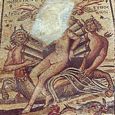 |
ICHTHYOCENTAUR |
IDA A nymph of Mount Ida on the Greek island of Crete. She was one of the nurses of the god Zeus who nursed him with the milk of the goat Amaltheia.
IDAIA A nymph of Mount Ida in the region of Troy, wife of the River Scamander.
IDYIA (Eidyia) The youngest of the Oceanides and wife of Aeetes king of Colchis.
ILISSUS (Ilissos) A river of Athens and its watery spirit.
IMBRASUS (Imbrasos) A river of the Greek island of Samos and its deity.
INACHUS (Inakhos) A river of Argos in southern Greece and its spirit. When Poseidon and Hera were contesting for dominion of Argos, he ruled in favour of Hera, causing Poseidon to dry up his stream.
INO A woman transformed into a sea-goddess after she leapt into the sea to escape her crazed husband. She became a protectress of sailors who rescued men from drowning.
IO A Naiad nymph daughter of the river Inachus in the south of Greece. She was loved by Zeus who transformed her into a cow to hide her from the jealous gaze of his wife Hera. But the goddess was not fooled and sent a maddening gladfly to torment Io which drove her to wander all the way to Egypt, where she gave birth to Epaphus, ancestor of all the Pharaohs.
IOKE The female personification of onslaught, pursuit and rout in battle.
IONIDES Four Naiad nymph daughters of the river Cytherus in the south of Greece whose springs were reputed to possess healing properties.
IRENE (Eirene) The goddess of peace and the season of spring, one of the three Horae (Seasons).
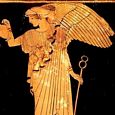 |
IRIS |
ISMENE A Naiad nymph daughter of the River Asopus in the south of Greece and wife of King Argus, the ancient patronym of the Argive region..
ISMENIS A Naiad daughter of the River Ismenos of Boeotia in central Greece loved by the god Faunus.
ISMENUS (Ismenos) A river of Boeotia in the heart of Greece and its deity.
ISTRUS (Istros) A deity of the Scythian river Danube.
ITHAX The messenger of the Titans.
IYNX The goddess-nymph of a magical love-charm known as the iynx. The iynx was a spinning wheel with a wryneck bird attached.
JACCHUS (Iakkhos) The torch-bearing daemon who led the procession of the Eleusinian Mysteries.
JAPETUS (Iapetos) One of the six-Titan brothers imprisoned by Zeus in the pit of Tartarus.
JASION (Iasion) Aspring-time consort of the goddess Demeter.
JASON (Iason) A great Thessalian hero who led the Argonauts in the quest for the Golden Fleece.
JINX (Iynx) The nymph of the magical love-charm known as the iynx.
KERES The monstrous female daemons of violent death which swooped over the battlefield in the thousands, ripping the souls of the dying from their bodies and casting them down into Hades.
LACHESIS (Lakhesis) One of the three Fates. LADON (1) A hundred-headed dragon which guarded the golden apples of the Hesperides. It was slain by Heracles.
LADON (2) A river of Arcadia and its god.
LAELAPS (Lailaps) A magical dog that was destined always to catch is prey. It was turned to stone by Zeus when it was set to chase the Teumessian Fox - a beast tha was fated never to be caught.
LAESTRYGONES (Laistrygones) A tribe of man-eating giants encountered by Odysseus on his travels.
LAMIA (1), LIBYAN (Lamia Libys) A terrifying phantom who preyed on children. She had the ability to remove her eyes.
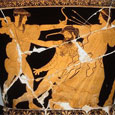 |
LETO |
LAMIAE (Lamiai) Vampiric monsters who appeared as ghostly, handsome women. They lured young men to their beds to drank their blood and fed on their flesh.
LAMIDES Naiad nymphs of the river Lamos who nursed the infant Dionysus.
LAMOS A river of Cilicia or Mount Helicon in Boeotia and its god. He and his sons and daughters were nurses of the god Dionysus.
LAMPADES The torch-bearing nymphs of Hades. They formed part of the retinue of Hecate in her night-time jaunts.
LAMPETIA A nymph daughter of Helios who cared for her father's sheep-flocks on the island of Thrinacie.
LANGIA The Naiad nymph of a Nemean spring.
LELANTUS (Lelantos) One of the Titanes.
LENAE (Lenai) The Satyr-daemones of the wine-vat. They treaded the grapes of Dionysus with their dance.
LENEUS One of the drunken old Silens in the retinue of Dionysus. He was the demi-god of the treading of grapes in the wine trough.
LEON A lion-headed Gigante slain and stripped of his skin by Heracles in the giant-wars.
LETHE (1) The female personification of forgetfulness.
LETHE (2) The goddess of the underworld river of oblivion.
LETO The Titan goddess of motherhood and womanly demure. She was loved by the god Zeus, and after a pregnancy hounded across the earth by the goddess Hera, she gave birth to twins, Apollo and Artemis.
LEUCE (Leuke) An Oceanid nymph loved by the god Hades. She was carried off to Elysium and transformed into a holy white poplar tree.
LEUCIPPIDES Two maidens loved by the Dioscuri who were granted immortality as the wives of these twins.
LEUCOTHEA (Leukothea) A princess of Thebes who was transformed into a goddess when she leapt into the sea with her infant son. She was a goddess who came to the aide sailors in distress.
LIBETHRIDES (Leibethrides) Naiad nymphs of the sacred Boeotian and Pierian springs of the goddess Muses.
LIBYA (Libye) The Oceanid nymph who gave her name to the continent of Libya (Africa).
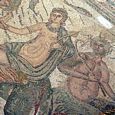 |
LEUCOTHEA |
LIMNAEE A Naiad nymph of the Indian river Ganges.
LIMNATIDES Naiad-nymphs of lakes.
LIMONIDES (Leimonides) Nymphs of meadows and pastures.
LIMOS The emaciated female personification of hunger.
LIPS The god of the South-West wind.
LIRIOPE A Naiad nymph loved by the river-god Cephisus. She was the mother of the vain youth Narcissus.
LITAE (Litai) The frail and elderly goddesses of prayers followed in the footsteps of Ate, the bringer of ruin.
LOTIS A Naiad nymph who fled the embrace of the god Priapus and was transformed into a lotus flower.
LOXO An Hyperborean nymph attendant of Artemis.
LUPA (Lupe) The female personification of pain.
LYCANTHROPES (Lykanthropoi) Men who could assume the shape of wolves. They are regarded as "proto-werewolves" of later folklore .
LYCUS (Lykos) One of three satyr messengers of the god Dionysus.
LYSSA The female personification of madness and mad rage.
MACARIA (Makaria) The goddess of a blessed death or afterlife. MACHAE (Makhai) The personifications of battles and combats.
MACRIS (Makris) A rustic nymph of the island of Euboea, who nursed the infant god Dionysus.
MACROCEPHALI (Makrokephaloi) A fabulous tribe of African men with long heads.
MAEANDER (Maiandros) A river of Caria and its god.
MAERA (1) (Maira) A star-nymph daughter of the Titan Atlas, and wife of the Arcadian King Tegeates. She was the goddess of the scorching dog-star Sirios.
MAERA (2) (Maira) A Naiad nymph daughter of the river Erasinus who, with her sisters, was an attendant of the goddess Britomartis.
MAIA A Pleiad star-nymph of Mount Cyllene in Arcadia. She was the mother of the god Hermes by Zeus.
MANAIE (Maniai) The female personification of madness and crazed frenzy.
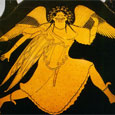 |
MEDUSA |
MARON One of the drunken old Silen gods. He was the charioteer of the god Dionysus.
MARSYAS A flute-playing satyr who challenged Apollo to a musical contest. The god won and flailed the satyr alive as punishment.
MATTON The daemon of baking and the kneeding of bread.
MEDUSA (Medousa) A serpent-haired Gorgon who was slain by the hero Perseus. When she was beheaded her two children by Poseidon were born from her bloody neck.
MEGAERA (Megaira) One of the three Erinyes.
MELAENA (Melaine) A Naiad nymph of Mount Parnassus loved by the god Apollo.
MELANIPPE A prophetic nymph daughter of the centaur Chiron. She was transformed into a mare as punishment for revealing the secrets of the gods.
MELIA (1) The Oceanid nymph wife of the Argive river-god Inachus.
MELIA (2) The Oceanid nymph of the sacred Ismenian spring of Thebes. She was loved by the god Apollo.
MELIA (3) The nymph mother of the Pelopennesian centaurs by the god Silenus.
MELIA (4) A nymph of Bithynia loved by the god Poseidon.
MELIA (5) A Bithynian nymph loved by the god Silenus.
MELIA (6) A nymph of the island of Ceos loved by Apollo.
MELIADES Dryad-nymphs of fruit-trees and orchards.
MELIAE (Meliai) Nymphs of ash-trees and honey bees. They were born born from the blood of the castrated sky-god Uranus along with the Giants and Curetes. The Melaie were the wives of the Silver Race of Man, and so the ancestresses of mankind.
MELIBOEA (1) (Meliboia) The Oceanid nymph wife of the first Arcadian king Pelasgus.
MELIBOEA (2) (Meliboia) An Oceanid nymph of Syria loved by the river Orontes.
MELICERTES (Melikertes) A boy transformed into a sea-god, after his mother Ino leapt with him into the sea.
MELINOE A spectral underworld goddess who haunted the night with her train of ghosts.
MELISSAE (Melissai) Nymphs of honey bees.
MELISSEUS The old Curete god of honey and honey-mead. His two daughters, Ida and Adrasteia, were nurses of the god Zeus.
MELITE (1) A Naiad nymph of the island of the Phaeacians. She was seduced by Heracles.
MELITE (2) A Naiad nymph daughter of the river Erasinus who, with her sisters, was an attendant of the goddess Britomartis.
MELPOMENE The Muse of tragedy.
MEMPHIS A Naiad nymph daughter of the River Nile. She was the wife of the very first Egyptian king Epaphus, who named his capital after her.
MENAE (Menai) The goddess nymphs of the fifty lunar months of the four-year Olympiad. They were daughters of Selene the Moon.
MENIPPE A Naiad nymph daughter of the river Peneius.
MENOETES (Menoites) A daemon of the underworld, he was the herdsman of the cattle of Hades.
MENOETIUS (Menoitios) The Titan god of rash anger. He was blasted into Erebus with a thunderbolt by Zeus.
MEROPE One of the Pleiad star-nymphs, the wife of the impious Corinthian King Sisyphos. Blushing in shame for her husband's crimes, her star shone only faintly.
MESSEIS The Naiad nymph of an Argive spring, a daughter of the River Inachus.
MESSEMBRIA The sixth of the twelve Horai (Hours), she was the goddess of the hour of noon.
METHE The goddess nymph of drunkenness. She was a companion of Dionysus.
METHONE The nymph wife of the first Pierian King Pierus.
METIS (1) The Titan goddess of good counsel. She was an adviser to Zeus in the Titan War, but when it was prophesied that she would bear a son greater than his father, the god put her away inside his belly. Their daughter Athena was born from the cracked skull of the god.
METIS (2) A Naiad nymph of the Lydian river Meles. According to legend, she was the mother of the poet Homer.
METOPE The Naiad nymph wife of the Argive river-god Asopus.
MIDEIA A nymph of the Boeotian town of Aspledon loved by the god Poseidon.
MIMAS One of the Gigantes who slain in the giant-war by Hephaestus with barage of red-hot metal.
MINOS A lawmaking King of Crete who was appointed a judge of the dead in the underworld.
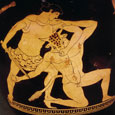 |
MINOTAUR |
MINTHA (Minthe) A Naiad nymph daughter of the underworld river-god Cocytus. She was transformed into a mint plant by Persephone when her affair with the god Hades was discovered.
MISA A primeval goddess of the Orphic mysteries.
MNEMOSYNE The Titan goddess of memory, words and language. She bore Zeus the nine goddess Muses after spending a night lengthened ninefold in the arms of the god.
MOIRAE (Moirai) The three goddesses of fate who spun and cut the thread of human life.
MOMUS (Momos) The male personfication of mockery. He was thrown out of heaven by Zeus for his scarping criticisms of the gods.
MONOCERATA (Monokerata) A breed of magical one-horned horses (unicorns) native to India.
MOREA The Hamadryad nymph of the mulberry bush.
MORIA A Lydian nymph whose brother Tylos was slain by a dragon. She discovered a herb which restored the boy to life.
MORMOLYCEIA (Mormolykeia) Vampiric ghostly women.
MORPHEUS A god of prophetic dreams who appeared in the sleep of kings as a human shaped phantasm. His two brothers, Icelus and Phantasus, assumed the forms respectively of animals and inanimate objects.
MORUS (Morus) The male personification of the doom.
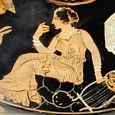 |
MUSES |
MUSES (2) (Mousai) The three Titan Muses. The foremost of these was Mneme, mother of the younger nine.
MUSES (3) Mousai) The three Delphic Muses, daughters of the god Apollo.
MUSICA (Mousika) The third of the twelve Horai (Hours), she was the goddess of the morning hour of music.
MYCENE (Mykene) A Naiad nymph daughter of the river Inachus after whom the city of Mycenae was named.
MYLINUS (Mylinos) A giant of the island of Crete vanquished by Zeus.
MYRMECES INDIAN (Myrmekes Indikoi) Gigantic ants which guarded the gold fields of the Indian desert.
MYRTOESSA A Naiad nymph of the Arcadian town of Megalopolis.
MYSIAN NAIADES (Naiades Mysiai) Naiad Nymphs of a spring in Mysia who kidnapped the boy Hylas, a handsome young companion of Heracles.
MYSTIS The rustic nymph of the Dionysian Mysteries. She was a nurse of the god on the island of Euboea.
NAIADS (Naiades) Fresh-water nymphs. They were daughters of Oceanus and the River-gods. There were various types: Crinaeae (of fountains), Pegaeae (of springs), Eleionomae (of marshes), Potameides (of rivers), and Limnades (of lakes).
NACOLE (Nakole) The eponymous nymph of the Phrygian town of Nacoleia.
NANA A Naiad nymph daughter of the Phrygian river Sangarius. She was impregnated by an almond which fell from the tree grown from the severed male genitals of the goddess Agdistis.
NAPAEAE (Napaiai) Dryad-Nymphs of vales and dells.
NEADES Gigantic monsters which roamed the island of Samos. They could split apart the earth with their roar.
NEAERA (1) (Neaira) A nymph loved by the sun-god Helius. She bore him the nymphs Lampetia and Phaethusa.
NEAERA (2) (Neaira) The Naiad nymph wife of the Thracian river-god Strymon.
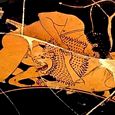 |
NEMEAN LION |
NEDA One of the elder Oceanides and the goddess of the Arcadian river Neda. She was one of the Arcadian wet-nurses of the infant Zeus.
NEICEA (Neikea) The female personifications of grievance and quarrel.
NEMEA The Naiad nymph of the town of Nemea. She was a daughter of either Zeus and Selene or the river Asopus.
NEMEAN LION (Leon Nemeios) A magical lion which was invulnerable to the weapons of man. It was slain by Heracles who strangled it to death and made a cloak of its skin.
NEMESIS The goddess of indignation and retribution for hybristic behaviour and undeserved good fortune. After being seduced by Zeus in the form of a swan, she lay the egg from which Helen was hatched.
NEPHELAE (Nephelai) Nymphs of the clouds.
NEPHELE (1) A cloud nymph which Zeus formed into the likeness of his wife Hera. When the hero Ixion raped her, he was condemned to eternal torture. The Nymphe spawned the tribe of centaurs from the unwanted union.
NEPHELE (2) The cloud nymph wife of the hero Athamas. When her children Phrixus and Helle were about to be sacrificed to the gods she sent the flying golden-fleeced ram to rescue them from the altar.
NEPHELE (3) One of the attendant nymphs of Artemis.
NEREIDS (Nereides) The fifty sea-goddess daughters of Nereus. They personified different aspects of the sea.
NERITES A young sea-god loved by either Aphrodite or the god Poseidon. He was transformed into a cockle-shell as the punishment for some offence.
NEREUS An ancient fish-tailed sea-god known as the Old Man of the Sea. He was the father of the fifty Nereides.
NESOI The Nesoi were goddesses of islands. Each island was said to have its own personification.
NESSUS (Nessos) A centaur ferryman who tried to rape the wife of Heracles, Deianeira, as he was carrying her across his river. Heracles heard her screams and shot him dead with poisoned arrows. The dying centaur tricked the girl into taking a sample of his poisoned blood to use as an aphrodisiac should her husband ever prove unfaithful.
NICAEA (Nikaia) A Naiad nymph daughter of the river Sangarius and virgin follower of the goddess Artemis. When she shot dead the man who loved her, Eros was enraged and drove Dionysos to rob her of her virginity.
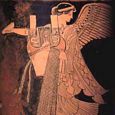 |
NIKE |
NILE (Neilos) The river of Egypt and its god.
NOMIA A Dryad nymph of the Nomia Mountains of Arcadia.
NOMUS (Nomos) The male personification of law. His wife was Eusebia, morality.
NONACRIS (Nonakris) A Naiad nymph of the town of Nonacris. She was the wife of the impious Arcadian king Lycaon.
NOSI (Nosoi) The spirits of pestilence and disease which were released from Pandora's jar.
NOTUS (Notos) The god of the South Wind.
NYMPHE The fifth of the twelve Horai (Hours), she was the goddess of the morning hour of bath.
NYMPHS (Nymphai) The beautiful female nature spirits. There were various types: Naiades (fresh-water nymphs), Oreads or Dryads (tree nymphs - pine and oak), Meliae (ash-tree nymphs), Oceanides (cloud nymphs bringers of rain from the river Oceanus), Haliae (sea-nymphs), and the Lampiades (underworld nymphs).
NYMPHS OF ARTEMIS The sixty youngest daughters of Oceanus, these Oceanides became the constant virgin companions of the goddess Artemis.
NYMPHS OF THEMIS Three nymph daughters of Zeus and Themis who were guardians of the artifacts of the gods . The hero Perseus received his winged sandals, death sword and helm of invisibility from them.
NYSIADES Nymphs of the mythical Mount Nysa. They were the nurses of the god Dionysus who became the first of his Bacchantes.
NYSUS (Nysos) The old Silen god of Mount Cithaeron (or Nysa). He was the mentor of Dionysus. When he refused to relinquish the mountain to the god upon his return from his travels, the god and his soldiers dressed up as women, snuck onto the mountain and captured him.
NYX The Protogenos (Primeval goddess) of night. She was the mother of Light and Day by the god Darkness. Alone she spawned a host of spirits.
OCEANIDES (Okeanides) The three thousand fresh-water nymph daughters of the earth-encirling river Oceanus. They were nymphs of standing water (Naiads), clouds (Nephelai), cool breezes (Aurai), meadows (Leimonides) and groves (Alseides). The eldest of them were lower ranked Titan goddesses.
OCYPETE (Okypete) One of the three Harpies.
OCYRHOE (1) (Okyrhoe) A Naiad nymph of the island of Samos who was pursued by the god Apollon. When she attempted to flee the island by ship he turned the vessel to stone and transformed the pilot into a porpoise.
OCYRHOE (2) (Okyrhoe) A Naiad nymph of the Phrygian river Sangarius.
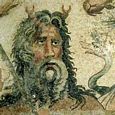 |
OCEANUS |
OCYRHOE (4) (Okyrhoe) A Teuthranian Naiad nymph loved by the god Hermes.
OCYRHOE (5) (Okyrhoe) A nymph daughter of the centaur Chiron who was transformed into a mare by the gods as punishment for misusing her prophetic gift.
OEDIPUS (Oidipous) The tragic Theban hero who destroyed the Sphinx.
OENOE (Oinoe) A nymph of the island of Sicinus loved by King Thoas.
OENONE (Oinone) A Naiad nymph daughter of the river Cebren of Troy. She was the first wife of Prince Paris who refused to heal him when he later returned to her seeking a cure for his mortal arrow-wound. She refused, and when he died she hung herself in remorse.
OENUS (Oinos) The male personification of wine.
OEOLYCA (Oiolyka) A sea nymph daughter of the storm giant Briareus. Some say the girdle of the Amazon Hippolyte first belonged to her.
OIZYS The female personification of pain.
OLETHRUS (Olethros) The personification of doom and destruction.
OLYMPUS (1) (Olympos) A Cretan god or giant. He was a mentor of Zeus, who later turned on the god by insiting the Gigantes against him.
OLYMPUS (2) (Olympos) The god of the Phrygian mount Olympus.
OMODAMON The Daemon 'Crudebake' who plagued the craftsman potter.
ONEIROI The dreams spirits. They issued forth at night in their thousands from the underworld like bats from a cave.
OPHIES PTERETOI A race of feathery-winged serpents which guarded the myrrh fields of Arabia.
OPHION A King of the Titanes. Cronus wrestled him for the throne of heaven and cast him defeated into the river Ocean.
OPHIOTAURUS (Ophiotauros) A black-skinned monster with the foreparts of a bull and the rearparts of a serpent. It was slain by the Sea-Titan Aegaeon during the Titan-War.
OPORA The goddess or female personification of the ripe fruit of late summer.
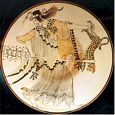 |
OREAD-MAENAD |
ORION A handsome earth-born giant who could walk on water. A great huntsman he was a close companion of Artemis and Leto. However, when he threatened to slay all the earth's beasts, Gaea despatched a scorpion to destroy him.
ORITHYIA (1) (Oreithyia) The nymph wife of the North Wind Boreas. She was abducted by the god from her home in Athens.
ORITHYIA (2) (Oreithyia) A nymph of Mount Lebanon in Phoenicia. She was the mother of the accursed girl Smyrna.
ORIUS (1) (Oreios) A man-eating, half-bear Thracian giant. He and his twin brother were transformed into birds by Hermes as punishment for their cruel barbarity.
ORIUS (2) (Oreios) The mountain god of Mount Othrys in Malis.
ORNEA The Naiad nymph of the Argive town of Orneae.
ORNITHES AREIOS A flock of arrow-shooting birds sacred to the god Ares which guarded his shrine amongst the Amazones.
ORPHNE An underworld Nymphe. She was the wife of the river-god Acheron.
ORSEIS The nymph wife of Hellen, the ancestral King of all the Hellenes (Greeks).
ORTHANNES A phallic god of garden fertility.
ORTHOSIA One of the Horae and the goddess of agricultural prosperity.
ORTYGIA The nymph of the sacred Ortygian grove in Lycia. She was a nurse of the god Apollo.
OSSA The female personification of rumour.
OTHREIS An Oread nymph of Mt Othrys in Malia. She was loved by two gods, Zeus and Apollo.
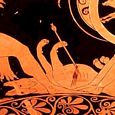 |
ORTHRUS |
OTUS (Otos) A gigantic son of Poseidon. He and his brother Ephialtes tried to storm heaven by piling mountains one upon the other. They were slain by Apollon and Artemis.
OUPIS A Hyperborean nymph in the retinue of the goddess Artemis.
OURANIA The Muse of astronomy.
OURANUS (Ouranos) The Protogenos (primeval god) of the dome of the sky. He was the first king of the cosmos who was castrated and deposed by his son Cronus.
OUREA The mountain gods. Each mountain had its own god.
OXYLUS (Oxylus) A rustic mountain god of thick forest. He was the father of the Hamadryad Nymphs.
PALAEMON (Palaimon) A young dolphin-riding sea-god who came to the aid of sailors in dsitress. He was a son of the princess Ino who was transformed into a godling when his mother leapt with him into the sea.
PALICI (Palikoi) The gods of two Sicilian geysers. They were also protectors of runaway slaves and defenders of the sacred oaths sworn on their waters.
PALIOXIS The male personification of backrush, one the spirits of the battlefield.
PALLAS (1) TheTitan-god of warcraft. He was the father of Victory, Force, Power and Rivalry.
PALLAS (2) A goatish Giant slain by Athena who flayed his skin for a shield.
PALLAS (3) A Nymph companion of the goddess Athena. She was accidentally killed during their war-games, and in her memory the goddess crafted the Palladium.
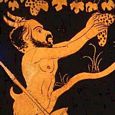 |
PAN |
PANACEA (Panakeia) The goddess of cures. She was a daughter of the medicine-god Asclepius.
PANDAISIA The goddess of banquets. She was one of the attendants of Aphrodite.
PANDIA (Pandeia) A goddess daughter of Zeus and Selene.
PANDORA The very first woman created by the gods. She opened the lid of a magic jar releasing the evils which plague mankind.
PANES Rustic daemones with the legs and horns of a goat. They were similar to the god Pan, but with more goatish faces.
PANNYCHIS (Pannykhis) The goddess of night-time parties and festivities. She was one of the attendants of Aphrodite.
PANOPIA (Panopeia) The Nereid goddess of panorama, the sighting of land and uncoming storms.
PAREGOROS The personification of soothing words. She was an attendant of Aphrodite.
PAREIA A nymph of the island of Paros loved by King Minos of Crete.
PARTHENOS A virgin goddess. She was a Naxian princess who leapt into the sea to escape the wrath of her stepfather Staphylos. Her real father Apollo then rescued her and transformed her into a goddess.
PASIPHAE A goddess-witch of the island of Crete, the wife of King Minos. She was filled with an unnatural desire for the Cretan Bull and after mating it conceived the bull-headed Minotaur.
PASITHEA One of the goddess Charites. She was married to Hypnus the god of sleep.
PASSALUS (Passalos) One of the monkey-like Cercopes.
PEGAEAE (Pegaiai) Naiad-nymphs of springs.
PEGASIS A Trojan Naiad nymph.
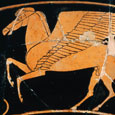 |
PEGASUS |
PEIRENE The weeping Naiad nymph of the fountain of the town of Corinth. She was loved by Poseidon.
PEITHO The Oceanid goddess of persuasion and seductive words. She was the nurse and close companionof the goddess Aphrodite.
PELIONIDES The nymphs of Mt Pelion, daughters of the centaur Chiron. They nursed the tribe of Centaurs spawned by the cloud nymph Nephele.
PEMPHREDO One of old hag Graeae.
PENELOPE (Penelopeia) An Arcadian Oread nymph. She was the mother of the god Pan by Hermes.
PENEUS (Peneios) A river of Thessaly and its god.
PENIA The female personification of poverty. She seduced the daemon Porus during the birthday celebrations of the goddess Aphrodite.
PENTHUS (Penthos) The male personification of grief and lamentation.
PERIBOEA (1) (Periboia) The Oceanid nymph wife of the Titan Lelantus.
PERIBOEA (2) (Periboia) The Naiad nymph wife of the Spartan Prince Icarius.
PERSEIS An Oceanid nymph loved by the god Helius. She was the mother of the witches Circe, Pasiphae and Aeetes.
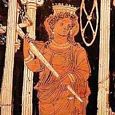 |
PERSEPHONE |
PERSES The Titan god of destruction and laying waste.
PERSEUS A great Argive hero who slew the Gorgon Medusa and rescued princess Andromeda from a sea monster.
PEUCE (Peuke) The Naiad nymph of an isle of the river Ister (the Danube).
PHAEA (Phaia) A wild sow which ravaged the town of Crommyon. It was slain by the hero Theseus.
PHAENON (Phainos) The god of the star Jupiter or Saturn. He was a beautiful boy once crafted by the Titan Prometheus. Zeus fell in love with him and made him a shining star-god.
PHAEO (Phaio) One of the starry Hyades.
PHAESYLE (Phaisyie) One of the starry Hyades.
PHAETHON (1) A son of the sun-god Helius who attempted to drive his father's chariot. He lost control and after scorching the earth was struck down by the bolta of Zeus.
PHAETHON (2) The handsome young god of the star Jupiter. He was seized by Aphrodite who appointed him the guardian-daemon of her temple.
PHAETHUSA (Paethousa) A nymph daughter of the sun-god Helios, and the shepherdess of his flocks on the island of Thrinacie.
PHALES The god of the phallus paraded in the Dionysian fertility procession. He was also a god of adultery and pedastery.
PHANES The golden-winged god of creation who hatched from the universal egg at the beginning of time.
PHARMACEA (Pharmakeia) The Naiad nymph of a poisonous spring near the town of Athens.
PHASIS A river of Colchis and its god.
PHAUNUS (Phaunos) A god of the forests, and an attendant of Dionysus. He was the same as the Italian Faunus.
PHEME The female personification of rumour.
PHERES LAMIOI Daemon guardians and companions of the infant god Dionysus. They were transformed into bull-horned satyrs-like beasts by Hera.
PHERESPONDOS One of the three Satyr messengers of the god Dionysus.
PHERUSA (Pherousa) The goddess of plenty and abundance. She was one of the Horae (Seasons).
PHIALE One of the attendant nymphs of the goddess Artemis.
PHIGALIA A Dryad nymph of the Arcadian town Phigalia.
PHILODICE (Philodike) A Naiad nymph daughter of the river Inachus, the wife of a Messenian king.
PHILOPHROSYNE The goddess of friendliness and welcome. She was one of the Charis daughters of Hephaestus.
PHILOTES The female personification of affection, friendship and perhaps also sex.
PHILYRA (Philyre) An Oceanid nymph loved by the Titan Cronus. When Rhea discovered their rendeavous he transformed himself into a stallion. From their union the centaur Chiron was born. Philyra was later transformed into a linden tree.
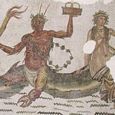 |
PHORCYS |
PHOEBE (1) (Phoibe) The Titan goddess of bright intellect and the oracle at Delphi. She gifted the shrine to her grandson Apollon on his birthday.
PHOEBE (2) One of the two Leucippides, Messenian princesses who became the goddess wives of the Dioscuri.
PHOEBE (3) (Phoibe) A Hamadryad nymph loved by King Danaus of Libya.
PHOENIX (Phoinix) A fabulous Arabian or Indian bird whose egg was hatched in flames.
PHOETIUS (Phoitos) A Gigante vanquished by the goddess Hera in the giant war.
PHOLUS (Pholos) An Arcadian centaur who once entertained Heracles in his cave with wine. When the other centaurs attacked Heracles drove them off with his poison arrows, but Pholus accidentally dropped one on his foot and died.
PHONOI The personificatied daemones of murder.
PHORCYS (Phorkys) An ancient crab-like Sea-God. He was the father and grandfather of most of the monsters of myth.
PHTHONUS (Phthonos) The personification of jealousy and envy.
PHUSIS The Protogenos (primeval goddess) of nature.
PHYLONOE A Spartan maiden made immortal by the goddess Artemis.
PISTIS The female personification of trust, honesty and good faith.
PITANE A Naiad nymph daughter of the Spartan river Eurotas. She was loved by Poseidon.
PITYS A Dryad nymph who fled the embraces of Pan and was transformed into a fir tree.
PLATAEA (Plataia) The Naiad nymph of the Boeotian town of Plataea loved by Zeus. The god pretended to be taking her for his bride when Hera abandoned their marriage.
PLEIADES Seven star nymph daughters of the Titan Atlas who were loved by the gods. They were transferred to heavens after the lusty giant Orion chased them for seven years.
PLEIONE The Oceanid nymph wife of the Titan Atlas. She and her daughter Pleiades were pursued by the lusty giant Orion for seven years before the gods placed them amongst the stars.
PLEISTUS (Pleistos) A river of Phocis and its god.
PLUTO (Plouto) The nymph mother of the impious Lydian King Tantalos by Zeus.
PLUTUS (Ploutos) The god of agricultural wealth. He was blinded by Zeus so that he would distribute wealth indiscriminately and not favour the good.
POENA (1) (Poine)The female personification of retaliation.
POENA (2) (Poine) A monstrous child-devouring she-dragon which was summoned forth from the underworld by Apollo to punish the Argives for the death of his infant son Linos.
POLEMUS (Polemos) The personification of war.
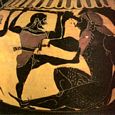 |
POLYPHEMUS |
POLYBOTES A Gigante crushed beneath the island of Nisyrus by the god Poseidon in the giant war.
POLYMNIA (Polyhymnia) The Muse of hymns.
POLYPHE The Oceanid nymph mother of the goddess Athena Hippia by Poseidon.
POLYPHEMUS (Polyphemos) A man-eating Cyclops who was blinded by the hero Odysseus.
POLYXO An Egyptian naiad.
POMPE The female personification of religious processions.
PONTUS (Pontos) The Protogenos (primeval god) of the sea.
PONUS (Ponos) The personification of hard labour.
PORPHYRION A king of the giants who was slain by Zeus and Heracles in the giant war when he attempted to rape Hera.
PORUS (Poros) The male personification of expediency. He was seduced by Penia (Poverty) at the birthday celebrations of Aphrodite.
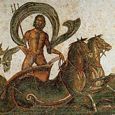 |
POSEIDON |
POTAMEIDES Naiad-nymphs of rivers.
POTAMOI The River god sons of Oceanus. Each river had its own god. They were manlike from the chest upwards, but below were bodied with the serpentine tail of a fish.
POTHUS (Pothos) The god of sexual longing. He was one of the winged Erotes (love gods).
PRAXIDICAE (Praxidikai) The goddess exacters of justice.
PRAXIDICE (Praxidike) The goddess exacter of justice.
PRAXITHEA The Naiad nymph wife of King Erechtheus of Athens.
PRIAPUS (Priapos) The rustic god of garden fertility. He was an ugly little satyr with enormous genitals.
PROIOXIS The battlefield personification of onrush.
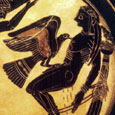 |
PROMETHEUS |
PRONOEA (Pronoia) The Oceanid goddess nymph of foresight. She was the wife of the Titan Prometheus.
PRONOMUS (Pronomos) One of the three Satyr messengers of the god Dionysus.
PROPHASIS The female personification of excuses.
PROSYMNA A Naiad nymph daughter of the river Asterion. She and her sisters Euboea and Acraea were nurses of the goddess Hera.
PROTEUS An old sea god, the herdsman of the seals of Poseidon. He was once captured by the hero Menelaus despite his shapeshifting.
PROTOGENOI The first born, primeval gods who made up the very fabric of the universe - Chronus (Time), Chaos (Air), Gaea (Earth), Tartarus (Hell Pit), Uranus (Sky), Pontus (Sea), Nyx (Night), Erebus (Darkness), Hemera (Day), and Aether (Light). They each consisted of their own element, though a few were known to assume an anthropomorphic manifestation.
PSALACANTHA (Psalakantha) An Icarian Nymphe who fell in love with the god Dionysus. When she attempted to drive away his love Ariadne, he transformed her into a plany-plant.
PSAMATHE The Nereid goddess of sand. She was seduced by King Aeacus of Aegina.
PSECAS (Psekas) One of the attendant nymphs of the goddess Artemis.
PSEUDOLOGOI The personifications of lies.
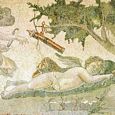 |
PSYCHE |
PTELEA The Hamadryad nymph of the elm tree.
PTOCHEIA (Ptokheia) The female personification of beggary.
PYGMIES (Pygmaioi) A tribe of two-foot tall men of India and sub-Saharan Africa who warred with winter-migrating cranes.
PYRIPHLEGETHON The underworld river of fire and its god.
PYRRHICHUS (Pyrrhikhos) The Curete god of the pyrrhichus dance.
PYROEIS The star god of the planet Mars.
PYTHON A gigantic serpent born of the sludge of the earth, which was appointed by Themis or Gaea to guard the Delphic Oracle. The god Apollo slew the beast with his arrows when he seized the shrine.
RHADAMANTHYS One of the three judges of the dead in the underworld and the Lord of the Islands of the Blessed.
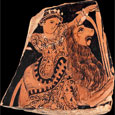 |
RHEA |
RHANIS One of the attendant nymphs of the goddes Artemis.
RHENE A nymph of the island of Samothrace loved by the god Hermes.
RHETIA The nymph mother of the Samothracian Corybantes by Apollo.
RHODE The sea nymph goddess of the island of Rhodes, and the wife of the sun-god Helius.
RHODOPE A Naiad nymph daughter of the Thracian river-god Strymon. When she and her husband Haemus impersonated Zeus and Hera, the angry gods transformed them into mountains.
SABACTES (Sabaktes) The Daemon 'Crash' who plagued the craftsman potter.
SAGARITIS A Hamadryas nymph loved by Attis, the young consort of Cybele. She was destroyed by the goddess when she learned of their affair.
SALAMIS A Naiad nymph daughter of the river Asopus who was abducted to the island of the same name by the god Poseidon.
SALMACIS (Salmakis) The Naiad nymph of a spring near the town of Halicarnassus who fell in love with the boy Hermaphroditus. Following a misinterpreted prayer to the gods, their two bodies were merged into one.
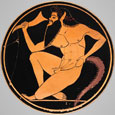 |
SATYR |
SANGARIUS (Saggarios) A river of Phrygia and its god.
SATYR OF ARGOS (Satyros Argios) A Satyr who attempted to rape the maiden Amymone but was caught in the act and chased away by the god Poseidon.
SATYRS (Satyroi) Mountain spirits of wilderness fertility. They appeared as animalistic men with the ears and tail of an ass, and erect phaluses.
SCAMANDER (Skamandros) A river of Troy and its god. When he attempted to drown the hero Achilles in the Trojan War, Hephaestus scorched his streams with fire.
SCIAPODS (Skiapodes) A tribe of African men. Each had a gigantic foot which they raised above their head to shade themselves from the burning Saharan sun.
SCIRON (Skiron) The god of the North-West Wind.
SCORPIOS (Skorpios) A giant scorpion which Gaea sent up from the earth to slay the giant hunter Orion, when he threatened to slay all the beasts of the earth.
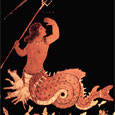 |
SCYLLA |
SCYRTUS (Skyrtos) A satyr attendant of the god Dionysos, who supported the god in his drunken stupors.
SELENE The goddess of the moon who rode through the sky at night in a chariot drawn by winged horses, or seated side-saddle on an ass. She fell in love with the young shepherd Endymion who was granted mmortality in a state of eternal sleep.
SEMELE The mother of the god Dionysus who was consumed by the lightnings of Zeus. Her son later fetched her up from the underworld and introduced her to Olympus as the goddess Thyone.
SILENI (Seilenoi) Elderly drunken Satyrs in the train of Dionysos.
SILENOS (Seilenos) The god of drunkenness, he was the mentor and companion of the god Dionysus.
SIMOEIS A river of Troy and its god.
SINOE An Arcadian nymph who nursed the god Pan.
SINOPE A Naiad nymph daughter of the river Asopus who was abducted tot he town of Sinope on the Black Sea by Apollo. She made him swear to respect her virginity.
SIRENS (Seirenes) Three sea-daemones with the heads of women and the bodies of bird. They dwelt on the island of Anthemoessa and lured sailers to their death with their irresistable song. The only man to hear their song and live was Odysseus who had himself bound to the ship's mast, in frustration the Sirens leapt into the sea and drowned.
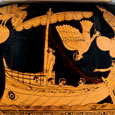 |
SIRENS |
SITHNIDES The Naiad nymphs of the certain springs near Megara.
SMARAGOS The Daemon 'Smash' who plagued the craftsman potter.
SOCUS (Sokos) A rustic god of the island of Euboea.
SOPHROSYNE The female personification of moderation and discretion.
SOSE A prophetic Oreiad nymph loved by the god Hermes.
SOSIPOLIS A starry child-god, worshipped in Elis.
SOTER The male personification of safety and delivery from harm.
SOTERIA The goddess personification of safety, recovery and salvation.
SPARTA (Sparte) The Naiad nymph wife of Lacedaemon, the first King of Sparta.
SPARTI (Spartoi) A race of earth-born warriors, which sprang fully grown with armour and weapons from the sown teeth of the Dragon of Ares.
SPERCHEIDES (Sperkheides) The Naiad nymph daughters of the river Spercheus.
SPERCHEUS (Sperkheios) A river of Malis and its god.
SPHINX A monster with the head of a woman, the body of a lioness and the wings of an eagle. She killed herself after Oedipus guessed the answer her riddle.
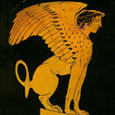 |
SPHINX |
SPONDE The seventh of the twelve Horai (Hours), she was the goddess of the hour of libations poured (after lunch).
STEROPE One of the starry Pleiad nymphs. She was loved by the god Ares.
STEROPES One of the three ancient, metal-working Cyclops.
STHENO One of the two immortal Gorgons.
STILBE A Naiad nymph daughter of the Thessalian river Peneius loved by the god Apollo.
STILBON The god of the star Mercury.
STROPHIA The Naiad nymph of a spring on Mount Cithaeron.
STRYMO A Naiad nymph daughter of the Trojan river Scamander.
STRYMON A river of Thrace and its god.
STYMPHALIAN BIRDS A breed of man-eating birds which haunted Lake Stymphalus in Arcadia. One of Heracles labours was to drive them from the lake.
STYX The goddess of the underworld river Styx, eldest of the Oceanides. She brought her children to side with Zeus in the Titan-War, and as reward he made her waters the inviolate oath of the gods.
SUNTRIBUS (Suntribos) The Daemon 'Shatter' who plagued the craftsman potter.
SYBARIS A monstrous Lamia or Dracaena who preyed upon the men of Phocis.
SYCE (Syke) The Hamadryad nymph of the fig tree.
SYCEUS (Sykeus) A Giant or Titan pursued by Zeus in the war against the gods. His mother Gaia hid him beneath the earth as the seed of the first fig-tree.
SYLLIS A nymph of Sicyon loved by the god Apollo.
SYMAETHIS (Symaithis) A Sicilian river-nymph loved by the god Pan.
SYMAETHUS (Symaithos) A Sicilian river and its god.
SYRINX A Naiad nymph chased by the god Pan. She fled his embrace and was transformed by her sisters into river reeds. The god crafted his famous pan-pipes from her plant.
TALOS A bronze giant which guarded the island of Crete, pelting passing ships with stones. He was slain by the Argonauts and the magic of the witch Medea.
TARAXIPPOI Horse frightening ghosts or spirits which haunted the race courses of Olympia, Nemea and the Isthmos.
TARTARUS (Tartaros) The Protogenos (primeval god) of the storm-wracked pit of Tartarus, which lay beneath the flat earth. His realm was the prison of the Titan gods. Tartarus fathered the monstrous storm-daemon Typhoeus.
TAYGETE The starry Pleiad nymph of Mount Taygetus who was loved by Zeus. She was the ancestress of the kings of Sparta.
TELCHINES (Telkhines) Evil magic-working daemons of the island of Rhodes. They were foster parents of the sea-god Poseidon, which were later destroyed by Zeus for their use of destructive magics.
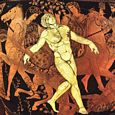 |
TALOS |
TELESPHORUS (Telesphoros) The god of convalescence. He was the son of the medicine-god Asclepius.
TELETE The female personification of the Dionysian mystery rites, and initiation into the orgiastic cult.
TELPHUSA (Telphousa) The Naiad nymph of the Boeotian spring Telphusia. Apollo buried her waters beneath rocks when she tried to deceive him.
TELPHUSIA (Telphousia) A Boeotian Erinys. She was the mother of the Theban dragon by Ares.
TEREINE A Thracian Naiad nymph loved by the god Ares.
TERPSICHORE (Terpsikhore) The Muse of choral dance and song.
TETHYS The Titan goddess of the subterranean sources of fresh-water and the nursing of the young. She was the wife of the Titan Oceanus and bore him three-thousand fresh-water Nymphs and innnumerable Rivers.
TEUMESSIAN FOX (Alopex Teumessios) A gigantic fox which ravaged the countryside of Thebes and was destined to remain uncatcheable. The hero Cephalus set the hunting dog Laelaps on its spoor, a beast destined to always catch its mark. Zeus perplexed by the contradicting fates turned the pair to stone.
THALASSA The Protogenos (primeval goddess) of the sea.
THALIA (1) (Thaleia) A Sicilian nymph who was impregnated by the god Zeus. Fearing the wrath of Hera she prayed to the god to be swallowed up by the earth. Her sons, the Palici gods, were born as geysers erupting from the ground.
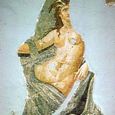 |
TETHYS |
THALIA (3) (Thaleia) The Muse of comedy.
THALLO The spring-time goddess Hora of green shoots.
THANATUS (Thanatos) The personification of (non-violent) death.
THAUMAS The god of the wonders of the sea. He was the father of Iris (the Rainbow) and whirlwind Harpies.
THEA (Theia) The Titan goddess of sight and clear blue skies. She was the mother of the Sun, Moon and Dawn.
THEAI The ancient greek word for goddesses.
THEBE A Naiad nymph daughter of the river Asopus abducted to the town of Thebes by Zeus..
THEISOA One of the Arcadian nymph nurses of the god Zeus.
THELPUSA (Thelpousa) A Naiad nymph daughter of the Arcadian river Ladon.
THEMIS (1) The Titan goddess of divine law, natural order and the oracles of the earth. She was the mother of the goddess Fates and Seasons by Zeus.
THEMIS (2) A Naiad nymph daughter of the Arcadian river Ladon loved by the god Hermes.
THEOI The ancient greek word for "gods".
THEOI GEORGICI (Theoi Georgikoi) The gods of agriculture and farming. Most of these were attendants of Demeter, the Queen of the fertile earth.
THEOI CHTHONIAN (Theoi Khthonioi) The gods of the underworld. They belonged to the court of King Haides.
THEOI HALIAN (Theoi Halioi) The gods of the sea. They were ruled by the Sea-King Poseidon.
THEOI NOMIAN (Theoi Nomioi) The gods of the countryside - pastureland and the wilds. Most of these fell within the domains of Dionysos Lord of wild vegetation, Artemis Queen of beasts, and Hermes god of the herds.
THEOI OLYMPIAN (Theoi Olympioi) The twelve great Olympian Gods (and their offspring) who presided over the various facets of Greek civilisation, society and culture.
THEOI URANIAN (Theoi Ouranioi) The gods of the sky. They were in the service of Zeus and Hera, King and Queen of the heavens.
THEOI TITANES The first generation of gods. They were largely superseded by the younger Olympians. The Titanes were primarily associated with time and prophecy.
THERES The ancient greek word for "monsters" and "beasts".
THERES, ETHIOPIAN (Theres Aithiopikoi) Many fabulous beasts were believed to inhabit the distant land of Ethiopia (Sub-Saharan Africa), including Dragons, Pegasi and Sphinxes, to the Catoblepas, Yale, Leucrocota, and Amphisbaena.
THERES, INDIAN (Theres Indikoi) Many fabulous beasts were thought to inhabit the distant land of India.
THERO The nymph nurse of the god Ares.
THESEUS The great Athenian hero who slew the Minotaur of Crete.
THESIS The Protogenos (primeval goddess) of creation and genesis.
THESPIA A Naiad nymph daughter of the river Asopus. She was carried off to Boeotia by the god Apollo.
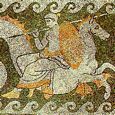 |
THETIS |
THISBE The eponymous nymph of the Boeotian town of Thebes.
THOON A Gigante clubbed to death by the Moerae (Fates) with clubs of bronze in the war of the giants.
THOOSA A sea nymph loved by the god Poseidon. She was the mother of the Cyclops Polyphemus.
THRACE (Thrake) A goddess-witch of Thrace. She had sons by Cronus, Zeus and the giant Briareus.
THRASSA A Thracian nymph daughter of the god Ares.
THRASUS (Thrasos) The spirit of overly bold or rash action and insolence.
THRIAE (Thriai) Prophetic nymphs of Mount Parnassus. They presided over the rustic art of divination by pebbles, and were goddesses of all birds of omen. These virgin nymphs may have had the bodies of bees.
THRONIA A Thracian Naiad nymph loved by the god Poseidon.
THYIA A Naiad nymph of Mount Parnassus loved by the god Apollo. She was the first to celebrate the orgies of Dionysus at Delphi.
THYMBRIS A prophetic Arcadian nymph. She was the mother of the mantic Pan by Zeus.
THYONE The mother of the god Dionysus who was destroyed by the lighnings of Zeus. Her son Dionysus later fetched her up from Hades to join the company of the gods on Olympus.
THYSA The goddess nymph of the frenzied state achieved by celebrants of the Dionysian orgy. She was a daughter of the god.
TIASA The Naiad nymph of a Spartan stream.
TISIPHONE One of the three Erinyes, goddesses of vengeance.
TITANIDES The female Titans. The eldest of these were the daughters of Uranus named Rhea, Themis, Thea, Mnemosyne, Tethys, Phoebe and Dione. They remained neutral in the Titan-War and retained their role of minor earth-goddesses into the reign of Zeus. Many of the daughters of the Titans were also called Titanides, such as Dione, Leto, Eos, Selene, and Hecate.
TITANS (Titanes) The six sons of Uranus (Oceanus, Coeus, Crius, Iapetus, Hyperion and Cronus) who overthrew their father Uranus. They were in turn overthrown by Zeus at the end of a ten year war and cast into Tartarus (except for Oceanus who remained neutral in the conflict). It appears that they were later released by Zeus and settled in Elysium. Some of their sons and grandsons were also called Titans.
TITHONUS (Tithonos) A handsome shepherd boy carried away by the dawn-goddess Eos as her consort. She obtained the gift of immortality for him but forget to ask for eternal youth. In time he shrivelled with age and the goddess transformed him into a cicada.
TITHOREA The eponymous Dryad nymph of the Phocian town of Tithorea.
TITYRI (Tityroi) A tribe of flute-playing rustic daemones, related to the Satyrs. They were companions of the god Dionysus.
TITYUS (Tityos) A giant who attempted to rape the goddess Leto. He was slain by Apollon and sentenced to eternal torture in Hades.
TRACHIUS (Trakhios) One of the one-eyed, metal-working giants known as Cyclopes.
TRIPTOLEMUS (Triptolemos) The agricultural-god of the sowing and threshing of grain. He was a hero of the goddess Demeter who gave him a golden winged chariot drawn by dragons to spread knowldedge of agriculture throughout the world.
TRITEIA The war-like sea nymph of the Achaian town of Triteia. She was the consort of the god Ares.
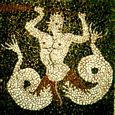 |
TRITON |
TRITONIDES Sea nymphs, daughters of the Tritons.
TRITONIS The goddess of Lake Tritonis in Libya. She was the mother by a sea-god of the Libyan goddess Athena.
TRITONS (Tritones) The fish-tailed daemones of the sea. They were named after the like-formed god Triton. Some of the Tritones were monstrous in appearance.
TRITOPATORES The "three fathers", ancient wind-gods of the generation of life.
TROCHILUS (Trokhilos) The demi-god of the mill will, used for grinding grain into flour. He was one of the Eleusinian attendants of the goddess Demeter.
TROGLODYTES A tribe of underground-dwelling men.
TROPHONIUS (Trophonios) A man swallowed up by the earth and transformed into an oracular Daemon.
TYCHE (Tykhe) The goddess of the good fortune and luck.
TYCHON (Tykhon) A phallic fertility daemon.
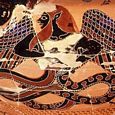 |
TYPHON |
UPIS (Oupis) A Hyperborean nymph in the retinue of the goddes Artemis.
URANIA (Ourania) The Muse of astronomy.
URANUS (Ouranos) The Protogenos (primeval god) of the sky - a solid bronze dome which enclosed the flat earth. Uranus was the first ruler of the universe who was castrated and deposed by his son the Titan Cronus.
XANTHUS (Xanthos) One of two immortal horses owned first by the hero Peleus and then by his son Achilles.
ZAGREUS (Zagreos) The first-born son of Zeus who the god seated on the throne of heaven armed with thunderbolts when he was but a babe. The Titan gods stole into Olympus, distracted the child, and dismembered him with their bloody knives. Athena recovered his heart, and the god was reborn through Semele as Dionysus.
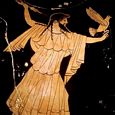 |
ZEUS |
ZEPHYRUS (Zephyros) The god of the gentle West-Wind and the season of spring.
ZEUS The King of the Gods, greatest of the twelve Olympians. He was the god of the heavens, weather, fate, and kings. His weapon was the fiery thunderbolt.
ZEUXIPPE An Athenian Naiad nymph, she was the mother of the Argonaut Butes.
Source: www.theoi.com
Walang komento:
Mag-post ng isang Komento